Craig Cliff's Blog, page 11
August 30, 2017
August consumption diary
I read/listened to 6 and a bit books for fun this month and read more than that for an essay, but let's start with music because I got a few things to say and you should hit play above while I prattle on.
MUSIC
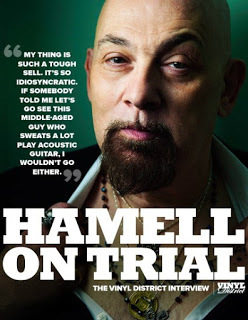 Hamell on Trial – A new discovery. He reminds me of Dave Wyndorf without the leather and the space rock and the comic books. It’s legitimate to ask what’s left of Wyndorf without those things… well, it’s Hamell on Trial. It helps that they are both about 60 and have the same, goateed, cat-eyed, plastic-surgery-but-not face, and seem to have self-confidence that belies their level of success. But it’s the world that wrong in both cases. Check out Ed Hamell and thank me later.
Hamell on Trial – A new discovery. He reminds me of Dave Wyndorf without the leather and the space rock and the comic books. It’s legitimate to ask what’s left of Wyndorf without those things… well, it’s Hamell on Trial. It helps that they are both about 60 and have the same, goateed, cat-eyed, plastic-surgery-but-not face, and seem to have self-confidence that belies their level of success. But it’s the world that wrong in both cases. Check out Ed Hamell and thank me later.(A week ago the award for 'old dude who I didn’t know existed but then I listened to lots this month' would have gone to Willy Nile. Commiserations Willy.)
The Eurythmics– Turns out Lennox/Stewart worked their way into my DNA as a kid and rewrote some of my genetic code. I challenge anyone between the ages of 29 and 36 to listen to their greatest hits now and not conclude this is the greatest music you used to hate. Unless you never hated them, in which case, you were a genius and I hope you still are.
(NB: This only applies to songs that were played on the radio back in the day. Anything that was new to me left me feeling NUTHIN'! Nostalgia, huh?)
Ryan Adams – Spoiler alert: I’m going to combine Prisoner and Prisoner B Sides as one album for my end of year list of the best music. I’ve never been a huge Ryan Adams guy, but something clicked for me with Prisoner and I love a lot of its supposed B sides. Is this the rare case that a double album might've been justified? Nah. The way these tracks were released was perfect.
Earworm of the month - 'Cumberland Gap' by David Rawlings (with a lotta help from Gillian Welch). I don't mind that it sounds A LOT like CSNY's 'Ohio', or it's one of about 1,000 songs called 'Cumberland Gap'. It's catchy as all get out.
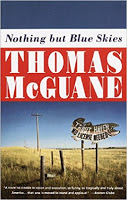 BOOKS (in order of consumption)
BOOKS (in order of consumption)Nothing but blue skies by Thomas McGuane (novel, audiobook)
An out of control novel about an out of control middle-aged dude in Montana. I enjoyed many aspects (its humour, its engagement with Clinton-era contemporary matters, the language), but it never quite hung together to be totally satisfying. I don't want to be that guy, but maybe I just like McGuane's short stories better.
My Name is Lucy Barton by Elizabeth Strout (novel, audiobook)
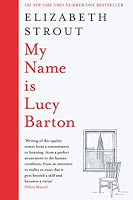 Cool control, that’s how I’d describe Strout’s style. This doesn’t pack the punch of Olive Kitteridge (or even attempt that book’s scope), but it still has teeth. I’ve got Anything is Possible, Strout’s latest queued up as my next read, so I might write more about this one with reference to that.
Cool control, that’s how I’d describe Strout’s style. This doesn’t pack the punch of Olive Kitteridge (or even attempt that book’s scope), but it still has teeth. I’ve got Anything is Possible, Strout’s latest queued up as my next read, so I might write more about this one with reference to that.Moranifesto by Caitlin Moran (non-fiction, audiobook)
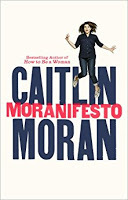 I really enjoyed How to be a woman, which was one of my top ten reads in 2012, the year I became the father of a little girl and future woman. Moranifesto has that same verbal vim and the ability to wed the personal and the political in relatable ways. And the audiobook, read by Joanna Neary, is a joy – Neary walks that tightrope between a Moran-impersonation and standard narrator voice, making it feel less like reading a book than having a slightly tipsy female friend hold forth on whatever’s grinding her gears most this minute.
I really enjoyed How to be a woman, which was one of my top ten reads in 2012, the year I became the father of a little girl and future woman. Moranifesto has that same verbal vim and the ability to wed the personal and the political in relatable ways. And the audiobook, read by Joanna Neary, is a joy – Neary walks that tightrope between a Moran-impersonation and standard narrator voice, making it feel less like reading a book than having a slightly tipsy female friend hold forth on whatever’s grinding her gears most this minute.Because it is, despite the political sounding title and politically focused preface, essentially a collection of columns, it feels disjointed and makes some of the entertainment pieces feel lighter than they might otherwise.
And on the politics, Moran’s pitch is essentially the same as Thomas L. Friedman’s in Thank you for being late: the internet and related technologies provides humanity the ability to get the best out of everyone, if used wisely. Whereas Friedman goes and talks to CEOs of tech companies in Silicon Valley and the Middle East, Moran is a bit more scattershot and dare I say it superficial, but better company and no less compelling.
The Animators by Kayla Rae Whittaker (novel, audiobook)
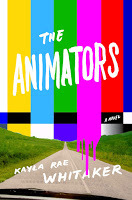 Hey, this was good. I almost said 'fun'. And it was fun in parts. But it puts its two main characters (the titular animators) through the works. There were elements I wasn’t fussed about, and it’d be a dick move to say, ‘great, for a first novel’, and go and list the structural whiffs and tropes I’ve seen before, but I can be a dick sometimes. Totally. But not today.
Hey, this was good. I almost said 'fun'. And it was fun in parts. But it puts its two main characters (the titular animators) through the works. There were elements I wasn’t fussed about, and it’d be a dick move to say, ‘great, for a first novel’, and go and list the structural whiffs and tropes I’ve seen before, but I can be a dick sometimes. Totally. But not today. Because I’d recommend this book to most anybody. Whittaker not only gives us two memorable protagonists and embeds the creation of not one but two feature length animated films within the text, but totally gets inside the process of creating something other than a novel and the way an animator might see the world.
The Butterfly Effect by Jon Ronson (non-fction, podcast/audiobook)
This was hard to classify as it’s only available on Audible, where I get my audiobooks from when I’m not borrowing them from various apps associated with my local library, but it’s more of a podcast than a book.
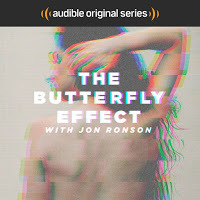
Ronson traces the impact of PornHub (and the other tube sites it snapped up) making hardcore porn free and accessible for everyone with an internet connection, and it takes him some interesting places (custom shoots including a guy who pays women to destroy his stamp collection). The structure demands that Ronson focus on the more unexpected, possibly uplifting elements of the shift, but he doesn’t ignore on the downsides (massive rise – excuse the pun – in erectile dysfunction in young men; virgins being placed on sex offender lists and having any hopes of a normal life being dashed). It’s light on the impact on women in the industry, partly because this is covered in other places (like Hot Girls Wanted, the film and later series on Netflix) and going over this ground might feel like flogging a dead horse. But shouldn’t we? To take porn is potentially soul destroying for the performers as read risks sidelining our empathy for these people. As a female, Christian, recovering porn addict says, ‘You don’t name a deer if you’re going to shoot it.’
Anyway, anything that wades into this space will be problematic in some ways, but it was really interesting and I’d recommend it to anyone.
Enchanted night by Steven Millhouser (novella, audiobook)
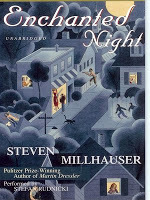 Pet hate: audiobooks with music tracks. This one featured annoying incidental music at certain points (including the first, like, 10 minutes) as well as a second narrator for one specific character (but not other female first person chapters) and a babbling vocal chorus are various points which, though indicated in the text, just felt hammy.
Pet hate: audiobooks with music tracks. This one featured annoying incidental music at certain points (including the first, like, 10 minutes) as well as a second narrator for one specific character (but not other female first person chapters) and a babbling vocal chorus are various points which, though indicated in the text, just felt hammy.This novella resembled the bitsy longer stories in Millhousers short fiction colelctions that I tend to like less than his more unified stories (indeed, I often begin to skim these longer ones).
I was interested to come across the sections here told from the perspective of a mannequin, who is both a mannequin and alive/enchanted.
There’s definitely a lot Millhouser and I share in common in terms of what interests us, what gets out fiction juices flowing, but in terms of how this book was constructed (and produced as an audio programme) meant I couldn’t enjoy it.
In progress:
4 3 2 1 by Paul Auster (novel, audiobook)
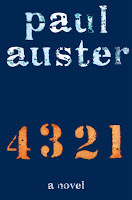 I normally wouldn’t write about something I was only a sixth of the way into, but when an audiobook is 36 hours long, there’s actually plenty to be said that far in. I was skeptical about the single life with four branching paths as described in the novel’s blurb, and wasn’t sure about committing one and a half days to such an endeavor. For some reason I imagined each scenario being told in its entirety before the next one started back at Fergusson’s birth. The actual structure is far more preferable: Chapter 1.0 covers everything up to Fergusson’s birth, 1.1 has Fergusson’s earliest memories, 1.2 overlaps slightly with 1.1 – enough to show there are some differences – but moves the story/chronology forward, 1.3 overlaps/contrasts with 1.2 before moving forward, and so on.
I normally wouldn’t write about something I was only a sixth of the way into, but when an audiobook is 36 hours long, there’s actually plenty to be said that far in. I was skeptical about the single life with four branching paths as described in the novel’s blurb, and wasn’t sure about committing one and a half days to such an endeavor. For some reason I imagined each scenario being told in its entirety before the next one started back at Fergusson’s birth. The actual structure is far more preferable: Chapter 1.0 covers everything up to Fergusson’s birth, 1.1 has Fergusson’s earliest memories, 1.2 overlaps slightly with 1.1 – enough to show there are some differences – but moves the story/chronology forward, 1.3 overlaps/contrasts with 1.2 before moving forward, and so on.There are very few ‘scenes’, as in something with dialogue or detailed desciptions of setting, characters appearances etc. Instead, there’s a lot of story-telling. And it’s intoxicating. At least, the first six hours have been…
And
Short story collections. A lot of short story collections. I read/reread books by Alice Tawhai, Lawrence Patchett, Nic Low, Sarah Quigley, Amy Head, Breton Dukes, Tracey Slaughter Helen Waaka, Pip Adam, Bill Manhire… and I also read parts of Steven Millhauser’s Voices in the Night and Lydia Millet’s Love in Infant Monkeyswhenever I wanted a non-Kiwi palate cleanser. This was all to inform my essay on ‘The Moves in Contemporary NZ Short Stories’, which I’m presenting on Saturday in Invercargill at the Dan Davin Short Story Conference (full programme here). I ended up taken a different path with the essay (one closer, in some ways, to the work I did with Recurrent Neural Networks earlier this year).
MOVIES/TV
Game of Thrones season 7 (& the Ringer’s Talk The Thrones after every episode) – I haven’t read GRRM’s books (well, I read the first 50 pages of the first book on a flight once, then the person whose book I borrowed woke up) and I like the way the presenters on Talk the Thrones are split 2/2 in terms of readers/Maesters and non-readers. This season was disappointing, in terms of what it could have been, but it was still appointment TV/streaming via Neon when the kids are in bed. The big question is: will I read the books in the 2 years between now and the final season?
Little Big Lies (season 1) – No. The great Michael Kiwanuka song in the intro and the murder-mystery / chorus of bitchy side characters in episode one hooked me in. But what followed was five episodes of the same kinds of scenes being rolled out again and again (hmm, here comes Perry, I wonder if he’ll hurt Celeste or not… oh, there he goes). And the teen daughter planning to auction off her virginity for a good cause – I’m sure I’ve seen that before. And then it got wrapped up in the seventh and final episode with the least surprising answer to who died and who dunnit. Pfft, yawn and argh.
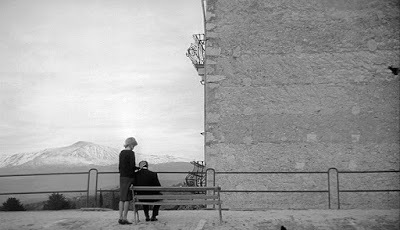 No, don't do it, just walk away, no, no... Oh. You shouldn't have done that.L’Avventura – A classic Italian film about two characters trying to track down a third. How could I not watch this given the book I’m working on? This is the kind of film my fictional filmmaker would feel embarrassed to say he didn’t like / left him feeling bupkis, but I am not that filmmaker. I totally get how it broke with tradition and sought to do something different with film – that doesn’t have to mean it was successful in making me feel what Antonioni intended the audience to feel. But 57 years is a long gap to bridge, I guess. My bad.
No, don't do it, just walk away, no, no... Oh. You shouldn't have done that.L’Avventura – A classic Italian film about two characters trying to track down a third. How could I not watch this given the book I’m working on? This is the kind of film my fictional filmmaker would feel embarrassed to say he didn’t like / left him feeling bupkis, but I am not that filmmaker. I totally get how it broke with tradition and sought to do something different with film – that doesn’t have to mean it was successful in making me feel what Antonioni intended the audience to feel. But 57 years is a long gap to bridge, I guess. My bad.Kids stuff
My kids are into the Smurfs at the moment thanks to some petrol store promotion, but they like the recent films (Smurfs 1 and 2) and not the animated series of my youth. Heathens!
Published on August 30, 2017 15:51
August 27, 2017
This is not a drill: Fortnight 15 of the Burns
Fortnight 15 wordcounts
Total words: 11,247 words (60% on the novel, 32% on non-fiction, 8% on this blog) 1stweek: 6,799 words (4 day week because I spent a long weekend in Chch for a 90thbirthday party, whoop!)2ndweek: 4,466 words (4 day week because of Hamilton…)
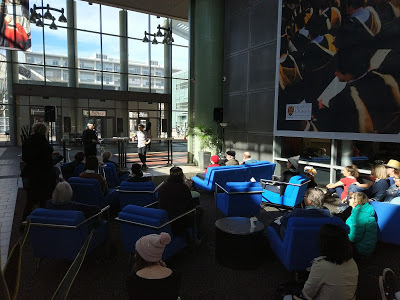 Poetry reading in The Link, NZ Poetry Day, 25 August
Poetry reading in The Link, NZ Poetry Day, 25 August
A Popular Boy
Last week, in the span of two days, I:spoke to a 300 level Modern and Contemporary Poetry class about my Google Translate and Recurrent Neural Network poetry (the stuff I covered in this post from May). took part in the NZ Poetry Day lunchtime event at The Link at the universitygave a talk about my novel-in-progress as part of the English Department’s Friday seminar series. I talked about why I’m writing about a levitating saint and making movies in the age of VFX, how I’m writing it, and read from two early chapters. This was the first time I’ve read from it. My wife hasn’t even read any of it yet – except maybe the half a page excerpt I included in my application for the Burns.
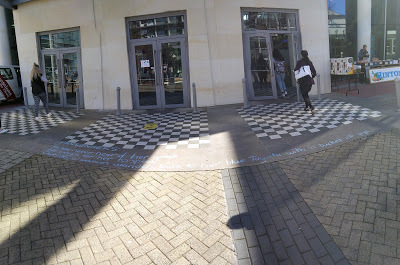 A poem I chalked outside The Link for NZ Poetry Day
A poem I chalked outside The Link for NZ Poetry Day
Smoove moves
A lot of this fortnight has been spent working on my paper for the Dan Davin Short Story Conference that kicks off on 1 Sept in Invercargill. After reading a bunch of NZ short story collections without any kind of framework/scientific rigour, I created my own framework for cataloguing the ‘moves’ a writer pulls when executing a short story and did a proof of concept (it took 4 hours to catalogue and analyse the 80 moves in the story I picked). And now I’m in the midst of writing it all up. You can read a slightly outdated spiel about my talk on the Conference’s website here (final papers will make it online eventually too, I think).
Anyway, it’ll be really interesting to have so many people talking about the short story – and being down in Invercargill. There’s a marae visit and an afternoon in Riverton on the last day, and then I’m taking my whanau to Stewart Island for four nights. Here’s hoping the Big September Storm doesn’t happen till after we’re back in Dunedin!
Hamil-yawn
I also went to Hamilton for a day/night last week for a thing that’s more to do with getting myself sorted for life after the Burns than writing. Everything about that trip in one word: meh.
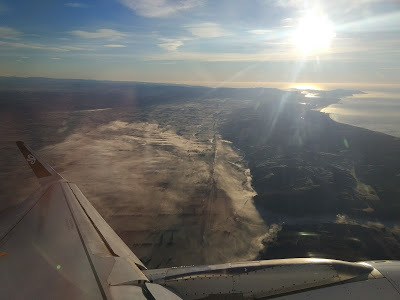 Localised fog over the Taieri Plains that kept me on the tarmac for two hours.
Localised fog over the Taieri Plains that kept me on the tarmac for two hours.
But, like, who really wants to leave Dunedin? Or go to Hamilton?
Tactical Procrastination
With all this other stuff on the go, you might think progress on the novel would have slowed.
But, so long as I was in Dunedin, I found myself plugging away at the next scene, and the next, and the next, partly as a way to put off writing my ‘The Moves’ thingy, or preparing for my talks.
I experienced this when working on The Mannequin Makers, at some point after passing the midpoint when the work had enough momentum that it wasn’t a matter of procrastinating from writing it, but I'd often use writing it to put off doing other things.
It’s cool to have reached this point of fulcrum on this year’s main project, but it’s too soon to take the foot of the gas completely – I can’t coast to the finish line in angel gear, that’s for sure. In fact, I plan to go back to my story-boarding/cue-carding ways this week to make sure the story doesn’t sag in the middle and readers are happily being pulled along to the climaxes they expect, and those they don’t.
I should probably also be mindful of life beyond the novel over the rest of the year. I was in bad shape physically after finishing The Mannequin Makers, in no small part due to the continuous, concentrated hours I could happily spend on the manuscript. (After being a slack writer for a couple of years, I lost the prescription glasses I needed after finishing TMM and haven’t replaced them coz my eyes kind of came right by themselves. Let’s see how they are when this next novel’s put to bed!).
Bird life Kereru at the uni
Kereru at the uni
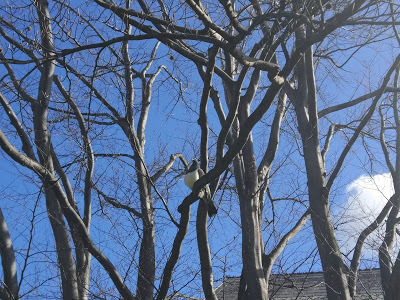 Kereru, closer
Kereru, closer
Total words: 11,247 words (60% on the novel, 32% on non-fiction, 8% on this blog) 1stweek: 6,799 words (4 day week because I spent a long weekend in Chch for a 90thbirthday party, whoop!)2ndweek: 4,466 words (4 day week because of Hamilton…)
 Poetry reading in The Link, NZ Poetry Day, 25 August
Poetry reading in The Link, NZ Poetry Day, 25 AugustA Popular Boy
Last week, in the span of two days, I:spoke to a 300 level Modern and Contemporary Poetry class about my Google Translate and Recurrent Neural Network poetry (the stuff I covered in this post from May). took part in the NZ Poetry Day lunchtime event at The Link at the universitygave a talk about my novel-in-progress as part of the English Department’s Friday seminar series. I talked about why I’m writing about a levitating saint and making movies in the age of VFX, how I’m writing it, and read from two early chapters. This was the first time I’ve read from it. My wife hasn’t even read any of it yet – except maybe the half a page excerpt I included in my application for the Burns.
 A poem I chalked outside The Link for NZ Poetry Day
A poem I chalked outside The Link for NZ Poetry DaySmoove moves
A lot of this fortnight has been spent working on my paper for the Dan Davin Short Story Conference that kicks off on 1 Sept in Invercargill. After reading a bunch of NZ short story collections without any kind of framework/scientific rigour, I created my own framework for cataloguing the ‘moves’ a writer pulls when executing a short story and did a proof of concept (it took 4 hours to catalogue and analyse the 80 moves in the story I picked). And now I’m in the midst of writing it all up. You can read a slightly outdated spiel about my talk on the Conference’s website here (final papers will make it online eventually too, I think).
Anyway, it’ll be really interesting to have so many people talking about the short story – and being down in Invercargill. There’s a marae visit and an afternoon in Riverton on the last day, and then I’m taking my whanau to Stewart Island for four nights. Here’s hoping the Big September Storm doesn’t happen till after we’re back in Dunedin!
Hamil-yawn
I also went to Hamilton for a day/night last week for a thing that’s more to do with getting myself sorted for life after the Burns than writing. Everything about that trip in one word: meh.
 Localised fog over the Taieri Plains that kept me on the tarmac for two hours.
Localised fog over the Taieri Plains that kept me on the tarmac for two hours. But, like, who really wants to leave Dunedin? Or go to Hamilton?
Tactical Procrastination
With all this other stuff on the go, you might think progress on the novel would have slowed.
But, so long as I was in Dunedin, I found myself plugging away at the next scene, and the next, and the next, partly as a way to put off writing my ‘The Moves’ thingy, or preparing for my talks.
I experienced this when working on The Mannequin Makers, at some point after passing the midpoint when the work had enough momentum that it wasn’t a matter of procrastinating from writing it, but I'd often use writing it to put off doing other things.
It’s cool to have reached this point of fulcrum on this year’s main project, but it’s too soon to take the foot of the gas completely – I can’t coast to the finish line in angel gear, that’s for sure. In fact, I plan to go back to my story-boarding/cue-carding ways this week to make sure the story doesn’t sag in the middle and readers are happily being pulled along to the climaxes they expect, and those they don’t.
I should probably also be mindful of life beyond the novel over the rest of the year. I was in bad shape physically after finishing The Mannequin Makers, in no small part due to the continuous, concentrated hours I could happily spend on the manuscript. (After being a slack writer for a couple of years, I lost the prescription glasses I needed after finishing TMM and haven’t replaced them coz my eyes kind of came right by themselves. Let’s see how they are when this next novel’s put to bed!).
Bird life
 Kereru at the uni
Kereru at the uni
 Kereru, closer
Kereru, closer
Published on August 27, 2017 10:30
August 16, 2017
Bringing the heat: Fortnight 14 of The Burns
 St Patrick's Basilica, South DunedinFortnight 14Total words: 13,319 (85% on the novel, 11% on this blog, 4% other)1stweek: 8,440 words (if you count the last Sunday of Fortnight 13, there was a 6-day streak of 1200+ word days)2ndweek: 4,879 (just a messier week)
St Patrick's Basilica, South DunedinFortnight 14Total words: 13,319 (85% on the novel, 11% on this blog, 4% other)1stweek: 8,440 words (if you count the last Sunday of Fortnight 13, there was a 6-day streak of 1200+ word days)2ndweek: 4,879 (just a messier week)
In context: this is my second most productive fortnight after Fortnight 12, but 8,440 in this fortnight 1st week is the highest single week wordcount.
After ten days of not working on my novel (friends visiting, trip to Catlins), I started reading through my manuscript from the beginning on the first Monday of this fortnight. By Wednesday I’d reached the end (circa 150 pages/50k words), having made some significant tweaks (moving the second part of a flashback to later in the manuscript, re-working some scenes, changing how a character speaks) which explains how I was able to keep the manuscript expanding on these days. There was also a lot of tszujing up/tightening at the sentence level.
As I said to my wife on Wednesday evening, this was the first read-through where I could feel myself enjoying it. Things were starting to click. The weight (or lightness) of certain scenes now felt right as they had their counterpoints in place (or I knew more about where they’d go and what they’d be).
There’s still a lot of work to do to get to the end of this first draft, but as I think I’ve said before, it won’t be a crappy first draft (or better not be). It should be more like draft 1.75. And hopefully I’ve been able to bottle enough of this optimism to carry me through the next few weeks and months of drafting (and the inevitable read-through where I feel like it’s all shit and what the hell was I thinking).
*
 St Patrick's Basilica, South Dunedin
St Patrick's Basilica, South DunedinThe first week I had two photoshoots and one interview.
The interview was with the Otago Daily Times for their annual piece on the Burns Fellow.
One of the photoshoots was with the ODT so they had something to go with the article. The other was for the Rogues Gallery of every past Burns Fellow in the University’s library. The photographer asked what I was working on, I told him a bit about my location scout novel and he suggested we head to the basilica in South Dunedin.
That place is fascinating. They’ve just spent millions doing it up, mostly the foundations and the exterior, and they’ve left the inside in a kind of sustainable state of decay. It’s very Italian.
I have seen the ODT piece or photo yet, but I've seen the one for the library and I'm not unhappy (can you ever really like a photo of yourself? Well, I can't).
*
I mentioned in Fortnight 13 that my internet at home was on the fritz. Well it took another week and a day to get that sorted. Or put another way, three phone calls and two emails with Slingshot, four calls with Chorus.
This meant we had to play catch-up with Game of Thrones last week when we finally got the juice switched back on. Having no internet (and rapidly depleted cellular data) is good for staying off Twitter, which helps stave off spoilers, so it wasn’t all bad.
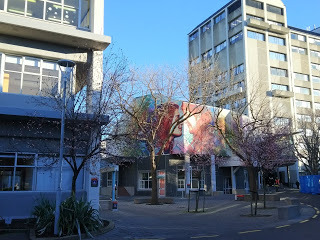 *
*The day after I stayed home for Chorus to finally fix my home internet, I stayed home with my sick son. The next day I had meetings with people in town for most of the day and man, I was really missing my office at the uni by the end of it. It’s gonna be hard to leave those 12 square metres behind after Christmas.
*
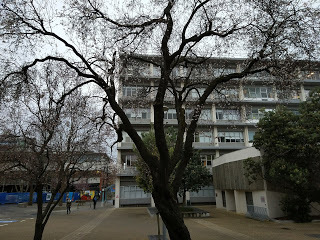
 Last week was the first I noticed blossoms on trees at the uni and a few days later the red rhododendrons were out in force.
Last week was the first I noticed blossoms on trees at the uni and a few days later the red rhododendrons were out in force. It's not completely dark when I have to wake my daughter up (she's a good sleeper, too good!) and it's still light while I cook dinner. Are you telling me that was winter in Dunedin?
Because that was nothing!
And I know there'll be shitty days every week from here to December. And there'll be that lamb-slaying storm in the first two weeks of September that should surprise exactly nobody.
But geez.
That was mild. Pleasant even.
Remind me why I live in Wellington again?

Published on August 16, 2017 01:16
August 1, 2017
July consumption diary
MUSIC
BOOKS
The Ask by Sam Lipsyte (novel)
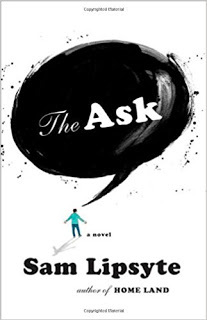 I’d been wanting to read this book since it came out (it had a buzz). When I finally got around to it, I couldn’t quite believe that it was published in 2010. Has it really been seven years? But also, in the way it seems to wallow in the downswing of the American Empire, it seems very NOW.
I’d been wanting to read this book since it came out (it had a buzz). When I finally got around to it, I couldn’t quite believe that it was published in 2010. Has it really been seven years? But also, in the way it seems to wallow in the downswing of the American Empire, it seems very NOW.
You can date it in some ways, like:
the passage about social media being about moving from one platform to a newer one (like Myspace to Facebook), rather than the splintering that occurred (something I’m guilty of myself in a story that occurs in A Man Melting, also published in 2010)the way people ‘open’ their phones.As Geoff Dyer put it in his review of the book in The Guardian:
Or, as my wife would put it, this is a “ranty” book. Which means it keeps company with Philip Roth, Saul Bellow, Vladimir Nabokov, the fun half of every Jonathan Franzen doorstop, Kurt Vonnegut, Joseph Heller, Martin Amis – so, just the swinging dicks of the last 75 years. Not bad company. Not for everyone, but definitely for me in certain moods.
This is the kind of book I wanted to write when I started writing seriously (...stops to do the maths…) fourteen years ago, when all I really knew were the swinging dicks. Now? I think it has definitely challenged me to ensure each page of my current novel is funny. Is tight. (So much of the humour comes from the concision.) My book won’t have the same level of verbal pyrotechnics – though there are already; some controlled, localised events, like public displays for Guy Fawkes and New Years.
The New Animals by Pip Adam (novel, NZ)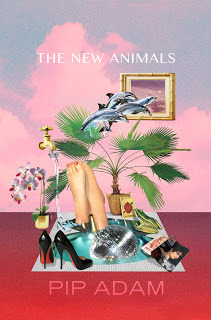
*Warning: may be slightly spoilery, but probably no more than a half-decent review*
*Reminder: this is not a review but a personal reflection on a temporarily revived, low-traffic blog*
A very different proposition to Lipsyte… or is it? There are verbal pyrotechnics here, but it’s the kind where a spark has set off everything inside a warehouse that stockpiles fireworks and you are across town and you maybe hear something, start wondering, see some smoke drift across the city five minutes later, check online, check again in the morning and only then read about the carnage as set down by some tired scribe.
There’s humour here, too. And an uber contemporary feel. But again, somehow it’s the opposite of Lipsyte’s showy sort.
The first two-thirds of the novel follow a day and late night in the life of a newish, smallish fashion house in Auckland, run by three Millennial males but supported by the labour of female Gen-Xers Sharona (pattern-cutter cum miracle worker), Carla (contract hairdresser) and Duey (Carla’s friend and hair-cutting better). And in the middle of this is young makeup artist Elodie. In the middle in terms of love triangle/polyhedron action, but she’s to the side of most of the text until the switch is flicked at the 2/3rds mark and suddenly, uh, woah, this is different.
To talk about the novel purely as a machine constructed to perform this shift is too reductive. I mean, it’s not about doing something apparently different for the sake of it. There’s something else at play here: the way the first part and the second (I should note there are no official “parts”, not even any chapters, just double line breaks when the perspective shifts between characters) interact/fire off each other is in the aid of an overall effect.
And, I mean, haven’t we all started out trying to explain something from the world today in straightforward terms and then, 2/3rds of the way through, gone: you know what, maybe the truth is more like THIS. Where THIS is an extended, surreal monologue, told with the cadence of a joke that continues to elude its punchline.
I’m not sure how I feel about learning that Elodie is effectively the daughter of John Key (poor kid with Jewish mum turned successful moneyman turned bland politician). I didn’t like it at the time, but probably because one of the models of my cult leader (in a hopefully non-obvious way) is John Key, and I was, on some cosmic level, butthurt.
But the ‘Elodie Key’ thing is just one of the many side-mystery/reveals in the novel that provide its momentum, where the main plot seems tailor-made (baddum-boosh) to provide little in the way of traditional thrust. I mean, the clock is ticking, the garment will be shot tomorrow, but the only one this really impacts is Sharona, and she’s done it all before. No, the novel gets you through on the back of little mysteries like:
Where did Carla go away to, and why?
and
What’s up with Duey, her look, her relationship with Carla?
And these are answered, or part-answered, in the Elodie section, and it’s all askew, but also helluva satisfying to be skewered in this way.
Thank You For Being Late: An optimist’s guide to thriving in the age of acceleration by Thomas L Friedman (non-fiction, audiobook)
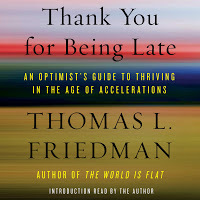 Oh man. I don’t know how Thomas Friedman getsso much (the rapid pace of change of technology, the nightmares of climate change, demography, economic and political destabilisation) and yet comes out the other end as an optimist. I mean, I follow his logic every time, but it takes some fricken fortitude to stare into the omni-headed monster and prescribe the right dental regime to tame the stank and calm the beast.
Oh man. I don’t know how Thomas Friedman getsso much (the rapid pace of change of technology, the nightmares of climate change, demography, economic and political destabilisation) and yet comes out the other end as an optimist. I mean, I follow his logic every time, but it takes some fricken fortitude to stare into the omni-headed monster and prescribe the right dental regime to tame the stank and calm the beast.
I fear I’m becoming one of those middle-aged, middle-income, white dudes who loves non-fiction and wants to foist the latest book they’ve read on other people as it’ll explain the way the world is now. Because I had such thoughts with Thank you for being late. But then, when I was all in on fiction, I never went around foisting novels or story collections on people. So maybe it’s just this book / this moment?
I do think, if you’re going to read it, read it now. 2018 will be too late. The world will have moved on, and I fear Friedman’s optimism may be even harder to comprehend.
The Saint, the Surfer and the CEO by Robin Sharma (“novel”, audiobook)
Another deliberate hate-listen. See Alain de Botton in May's diary.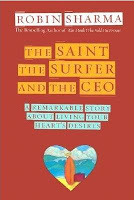 On one level, this is the easily the worst novel I’ve read since, um, high school. It’s basically a self-help book dressed up as a novel-length parable, except the outfit is so flimsy, and the thing tries to be a novel rather than a parable, that you get all the characters speaking like the guru Sharma thinks he is, as if in front of a packed auditorium, except it’s two guys on a beach in Hawaii.
On one level, this is the easily the worst novel I’ve read since, um, high school. It’s basically a self-help book dressed up as a novel-length parable, except the outfit is so flimsy, and the thing tries to be a novel rather than a parable, that you get all the characters speaking like the guru Sharma thinks he is, as if in front of a packed auditorium, except it’s two guys on a beach in Hawaii.
The main character, I’ve already forgotten his name, is your classic neutral, know-nothing narrative vessel, except he frequently breaks into ‘profound’ reflections, either in narration or dialogue, that he couldn’t possibly have at that point in the story. He gets some things too quickly, then asks his interlocutor to better explain other things that were perfectly well put the first time to allow Sharma to double-back and double-down when he needs to cram one more metaphor from his notebook into the text.
With all that said, is it so easy to dismiss the “teachings” within the book? As with anything that seeks to help people, make em better human beings, Sharma’s terrible novel gets points for positivity. I’m sure there’s lots folks could take away from this book. I personally don’t think the universe is perfectly designed and all about bringing things into harmony. I find it a troubling middle-and-upwards class concept.
Sharma’s is the kind of philosophy that seems customised for a highly individualised, neo-con, capitalistic society. And that can all get a bit icky if you stop and think about it, or anyone but the people you interact with on a daily basis.
If you’re looking to better yourself, might I recommend Thank You For Being Late: An Optimist’s Guide to thriving in the age of acceleration by Thomas L Friedman instead?
The Gathering by Anne Enright (novel, audiobook)
First half hour: yeah, I can see how this won the Booker (over our very own Mr Pip).
The rest: *looks at watch*
Can you tolerate this? by Ashleigh Young (non-fiction/essays, NZ)
This took me a couple of months to finish. That’s not a criticism. It’s one of the good things about collections.
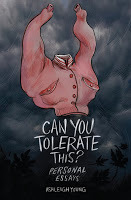 One of the reasons I stopped reading was because I left my copy on chair at the university while I made a thermos of tea (in theory this means I can have 3.5 hot cups of tea without having to leave my office, but my bladder normally runs out of patience before my thermos runs out of tea), and when I returned, it was gone. This was just after Young won the Windham-Campbell Prize and bookstores had run out of the second print run and a third was on its way. Peak Young, so to speak. Naturally I thought someone had nicked it, but a week later I found someone had handed it in at reception (this person had acted to protect the owner from having it nicked!). So I got it back, read the next essay, moved on to something else, returned, read another couple, left, returned, and finally finished in July.
One of the reasons I stopped reading was because I left my copy on chair at the university while I made a thermos of tea (in theory this means I can have 3.5 hot cups of tea without having to leave my office, but my bladder normally runs out of patience before my thermos runs out of tea), and when I returned, it was gone. This was just after Young won the Windham-Campbell Prize and bookstores had run out of the second print run and a third was on its way. Peak Young, so to speak. Naturally I thought someone had nicked it, but a week later I found someone had handed it in at reception (this person had acted to protect the owner from having it nicked!). So I got it back, read the next essay, moved on to something else, returned, read another couple, left, returned, and finally finished in July.
Most of these essays I enjoyed, but each for their own reasons. Some were smart, some were brave, some were smart and brave. A small number did nothing for me, but that's to be expected from anything proclaiming to be a collection of "Personal Essays".
It's great to see any NZ book being in demand and at risk of being nicked - doubly great that it's something as seriously different as this.
MOVIES/TV
Drinking Buddies – easily my favourite watch this monthThe Double (2013)GLOW Season 1 (abandoned at ep 5 to watch...)GLOW: The Story of the Gorgeous Ladies of WrestlingSee No Evil, Hear No Evil*Adaptation*And all the kids stuff like Trolls, Monsters University, Ratatouille, Shrek 1-4 (including Shrek 2 a bazillion times), with one eye on the TV/kid, the other on my phone (bad, bad parent!)*****
___
*Rewatch
BOOKS
The Ask by Sam Lipsyte (novel)
 I’d been wanting to read this book since it came out (it had a buzz). When I finally got around to it, I couldn’t quite believe that it was published in 2010. Has it really been seven years? But also, in the way it seems to wallow in the downswing of the American Empire, it seems very NOW.
I’d been wanting to read this book since it came out (it had a buzz). When I finally got around to it, I couldn’t quite believe that it was published in 2010. Has it really been seven years? But also, in the way it seems to wallow in the downswing of the American Empire, it seems very NOW.You can date it in some ways, like:
the passage about social media being about moving from one platform to a newer one (like Myspace to Facebook), rather than the splintering that occurred (something I’m guilty of myself in a story that occurs in A Man Melting, also published in 2010)the way people ‘open’ their phones.As Geoff Dyer put it in his review of the book in The Guardian:
The test for the obsessive prose stylist who lacks an instinctive gift for storytelling is always the same: what’s the minimum amount of plot you can get away with and still function within the parameters of a novel?... So if it takes little time to sketch the plot of Sam Lipsyte’s The Ask, that’s a backhanded way of saying it’s a stylistic tour de force.
Or, as my wife would put it, this is a “ranty” book. Which means it keeps company with Philip Roth, Saul Bellow, Vladimir Nabokov, the fun half of every Jonathan Franzen doorstop, Kurt Vonnegut, Joseph Heller, Martin Amis – so, just the swinging dicks of the last 75 years. Not bad company. Not for everyone, but definitely for me in certain moods.
This is the kind of book I wanted to write when I started writing seriously (...stops to do the maths…) fourteen years ago, when all I really knew were the swinging dicks. Now? I think it has definitely challenged me to ensure each page of my current novel is funny. Is tight. (So much of the humour comes from the concision.) My book won’t have the same level of verbal pyrotechnics – though there are already; some controlled, localised events, like public displays for Guy Fawkes and New Years.
The New Animals by Pip Adam (novel, NZ)

*Warning: may be slightly spoilery, but probably no more than a half-decent review*
*Reminder: this is not a review but a personal reflection on a temporarily revived, low-traffic blog*
A very different proposition to Lipsyte… or is it? There are verbal pyrotechnics here, but it’s the kind where a spark has set off everything inside a warehouse that stockpiles fireworks and you are across town and you maybe hear something, start wondering, see some smoke drift across the city five minutes later, check online, check again in the morning and only then read about the carnage as set down by some tired scribe.
There’s humour here, too. And an uber contemporary feel. But again, somehow it’s the opposite of Lipsyte’s showy sort.
The first two-thirds of the novel follow a day and late night in the life of a newish, smallish fashion house in Auckland, run by three Millennial males but supported by the labour of female Gen-Xers Sharona (pattern-cutter cum miracle worker), Carla (contract hairdresser) and Duey (Carla’s friend and hair-cutting better). And in the middle of this is young makeup artist Elodie. In the middle in terms of love triangle/polyhedron action, but she’s to the side of most of the text until the switch is flicked at the 2/3rds mark and suddenly, uh, woah, this is different.
To talk about the novel purely as a machine constructed to perform this shift is too reductive. I mean, it’s not about doing something apparently different for the sake of it. There’s something else at play here: the way the first part and the second (I should note there are no official “parts”, not even any chapters, just double line breaks when the perspective shifts between characters) interact/fire off each other is in the aid of an overall effect.
And, I mean, haven’t we all started out trying to explain something from the world today in straightforward terms and then, 2/3rds of the way through, gone: you know what, maybe the truth is more like THIS. Where THIS is an extended, surreal monologue, told with the cadence of a joke that continues to elude its punchline.
I’m not sure how I feel about learning that Elodie is effectively the daughter of John Key (poor kid with Jewish mum turned successful moneyman turned bland politician). I didn’t like it at the time, but probably because one of the models of my cult leader (in a hopefully non-obvious way) is John Key, and I was, on some cosmic level, butthurt.
But the ‘Elodie Key’ thing is just one of the many side-mystery/reveals in the novel that provide its momentum, where the main plot seems tailor-made (baddum-boosh) to provide little in the way of traditional thrust. I mean, the clock is ticking, the garment will be shot tomorrow, but the only one this really impacts is Sharona, and she’s done it all before. No, the novel gets you through on the back of little mysteries like:
Where did Carla go away to, and why?
and
What’s up with Duey, her look, her relationship with Carla?
And these are answered, or part-answered, in the Elodie section, and it’s all askew, but also helluva satisfying to be skewered in this way.
Thank You For Being Late: An optimist’s guide to thriving in the age of acceleration by Thomas L Friedman (non-fiction, audiobook)
 Oh man. I don’t know how Thomas Friedman getsso much (the rapid pace of change of technology, the nightmares of climate change, demography, economic and political destabilisation) and yet comes out the other end as an optimist. I mean, I follow his logic every time, but it takes some fricken fortitude to stare into the omni-headed monster and prescribe the right dental regime to tame the stank and calm the beast.
Oh man. I don’t know how Thomas Friedman getsso much (the rapid pace of change of technology, the nightmares of climate change, demography, economic and political destabilisation) and yet comes out the other end as an optimist. I mean, I follow his logic every time, but it takes some fricken fortitude to stare into the omni-headed monster and prescribe the right dental regime to tame the stank and calm the beast.I fear I’m becoming one of those middle-aged, middle-income, white dudes who loves non-fiction and wants to foist the latest book they’ve read on other people as it’ll explain the way the world is now. Because I had such thoughts with Thank you for being late. But then, when I was all in on fiction, I never went around foisting novels or story collections on people. So maybe it’s just this book / this moment?
I do think, if you’re going to read it, read it now. 2018 will be too late. The world will have moved on, and I fear Friedman’s optimism may be even harder to comprehend.
The Saint, the Surfer and the CEO by Robin Sharma (“novel”, audiobook)
Another deliberate hate-listen. See Alain de Botton in May's diary.
 On one level, this is the easily the worst novel I’ve read since, um, high school. It’s basically a self-help book dressed up as a novel-length parable, except the outfit is so flimsy, and the thing tries to be a novel rather than a parable, that you get all the characters speaking like the guru Sharma thinks he is, as if in front of a packed auditorium, except it’s two guys on a beach in Hawaii.
On one level, this is the easily the worst novel I’ve read since, um, high school. It’s basically a self-help book dressed up as a novel-length parable, except the outfit is so flimsy, and the thing tries to be a novel rather than a parable, that you get all the characters speaking like the guru Sharma thinks he is, as if in front of a packed auditorium, except it’s two guys on a beach in Hawaii.The main character, I’ve already forgotten his name, is your classic neutral, know-nothing narrative vessel, except he frequently breaks into ‘profound’ reflections, either in narration or dialogue, that he couldn’t possibly have at that point in the story. He gets some things too quickly, then asks his interlocutor to better explain other things that were perfectly well put the first time to allow Sharma to double-back and double-down when he needs to cram one more metaphor from his notebook into the text.
With all that said, is it so easy to dismiss the “teachings” within the book? As with anything that seeks to help people, make em better human beings, Sharma’s terrible novel gets points for positivity. I’m sure there’s lots folks could take away from this book. I personally don’t think the universe is perfectly designed and all about bringing things into harmony. I find it a troubling middle-and-upwards class concept.
Sharma’s is the kind of philosophy that seems customised for a highly individualised, neo-con, capitalistic society. And that can all get a bit icky if you stop and think about it, or anyone but the people you interact with on a daily basis.
If you’re looking to better yourself, might I recommend Thank You For Being Late: An Optimist’s Guide to thriving in the age of acceleration by Thomas L Friedman instead?

The Gathering by Anne Enright (novel, audiobook)
First half hour: yeah, I can see how this won the Booker (over our very own Mr Pip).
The rest: *looks at watch*
Can you tolerate this? by Ashleigh Young (non-fiction/essays, NZ)
This took me a couple of months to finish. That’s not a criticism. It’s one of the good things about collections.
 One of the reasons I stopped reading was because I left my copy on chair at the university while I made a thermos of tea (in theory this means I can have 3.5 hot cups of tea without having to leave my office, but my bladder normally runs out of patience before my thermos runs out of tea), and when I returned, it was gone. This was just after Young won the Windham-Campbell Prize and bookstores had run out of the second print run and a third was on its way. Peak Young, so to speak. Naturally I thought someone had nicked it, but a week later I found someone had handed it in at reception (this person had acted to protect the owner from having it nicked!). So I got it back, read the next essay, moved on to something else, returned, read another couple, left, returned, and finally finished in July.
One of the reasons I stopped reading was because I left my copy on chair at the university while I made a thermos of tea (in theory this means I can have 3.5 hot cups of tea without having to leave my office, but my bladder normally runs out of patience before my thermos runs out of tea), and when I returned, it was gone. This was just after Young won the Windham-Campbell Prize and bookstores had run out of the second print run and a third was on its way. Peak Young, so to speak. Naturally I thought someone had nicked it, but a week later I found someone had handed it in at reception (this person had acted to protect the owner from having it nicked!). So I got it back, read the next essay, moved on to something else, returned, read another couple, left, returned, and finally finished in July.Most of these essays I enjoyed, but each for their own reasons. Some were smart, some were brave, some were smart and brave. A small number did nothing for me, but that's to be expected from anything proclaiming to be a collection of "Personal Essays".
It's great to see any NZ book being in demand and at risk of being nicked - doubly great that it's something as seriously different as this.
MOVIES/TV
Drinking Buddies – easily my favourite watch this monthThe Double (2013)GLOW Season 1 (abandoned at ep 5 to watch...)GLOW: The Story of the Gorgeous Ladies of WrestlingSee No Evil, Hear No Evil*Adaptation*And all the kids stuff like Trolls, Monsters University, Ratatouille, Shrek 1-4 (including Shrek 2 a bazillion times), with one eye on the TV/kid, the other on my phone (bad, bad parent!)*****
___
*Rewatch
Published on August 01, 2017 01:17
July 30, 2017
Mutton chops: Fortnight 13 of the Burns
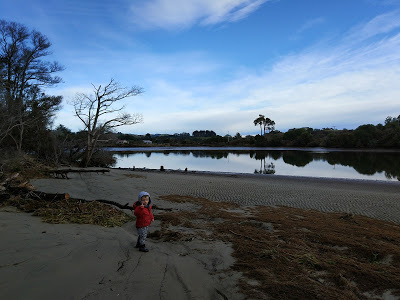 My son warning me to turn back and work on my novel, or else, PounaweaAs the ancients used to say, productivity comes before a fall.
My son warning me to turn back and work on my novel, or else, PounaweaAs the ancients used to say, productivity comes before a fall. History will record Fortnight 12 (14,262 words) as The Bubble and Fortnight 13 (...wait for it...) as The Crash (and not in the Ishigurovian sense).
Fortnight 13 total wordcount: 3,572 - sadly, that is not a typo.
* Week 1: 2,024 (all on the novel)* Week 2: 1,548 (all towards blog posts)
The litany of excuses is long and contains petty mix-ups and pretty photos.
1.
We had people staying with us (a family of four and then a family of three) every night except two this fortnight.
2.
I took the second week off to spend time with visitors and take them to the Catlins. We did the Southern part of the Catlins in March and did the Northern part this time.
It was ace.
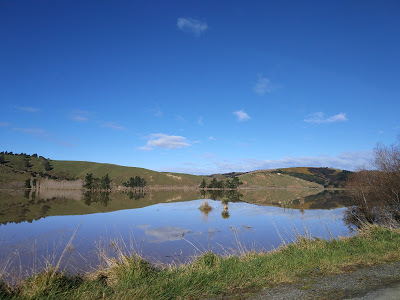 Floodwaters, East Taieri, (this is normally pasture)
Floodwaters, East Taieri, (this is normally pasture)on the drive south
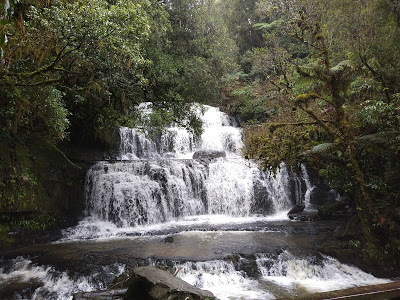 Purakaunui Falls
Purakaunui Falls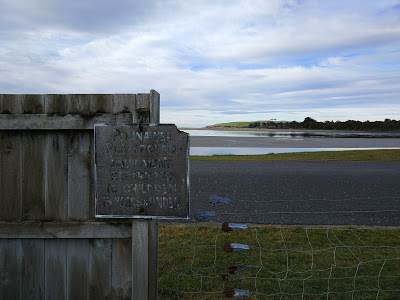 Pounawea
Pounawea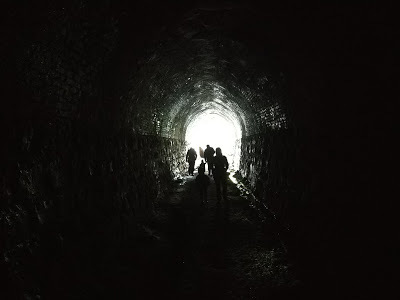 Tunnel Hill
Tunnel Hill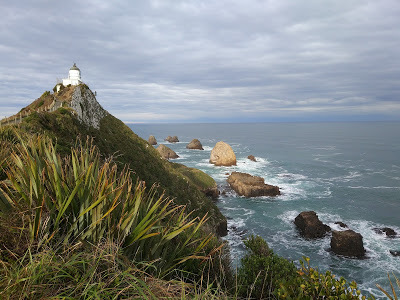 Nugget Point, with nuggets
Nugget Point, with nuggets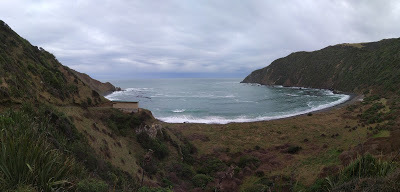 Roaring Bay
Roaring Bay (we had a five minute window [=kids], but saw a yellow-eyed penguin
from inside the hide on the left side of the bay)
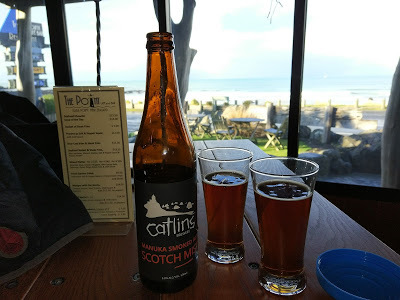 Catlins Brewery Scotch Mist Manuka Smoked Ale (would recommend),
Catlins Brewery Scotch Mist Manuka Smoked Ale (would recommend),Kaka Point
3.
I spoke at the Otago Institute's annual What's Hot event on 20 July at the Otago Museum.
I talked about the use of imperfect AI in poetry, which segued into my experiments with Recurrent Neural Networks which I blogged about in May.
But I went a bit broader, and more humorous, which took some prep. I even experimented with an Powerpoint-augmented poetry reading (and it wasn't as horrific as it sounds).
A fun event (other speakers covered what's hot in neuro-endocrinology, virtual reality and the medical humanities) and I've been asked to repeat my spiel to a class of undergrads later this semester.
4.
I took part in the Meet the Fellows Event at the Art Gallery on 23 July.
This didn't take much prep, it just soaked up most of a Sunday. But I don't normally write much on Sundays and I had guests anyway, so this isn't really an excuse for pour wordcounts, more of a thing that happened this fortnight.
Also, an excuse to mention the latest WRONG NAME with which I've been saddled.
I've had Cliff Craig, Chris Craig, even Colin Craig. But Chris Curtis was bold new territory!
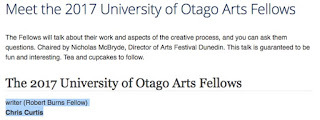
(I'm a little bummed we've skipped the phase where I'm confused with Cliff Curtis.)
5.
I've started work on my paper for the Dan Davin Short Story Conference, which kicks off in Invercargill on 1 Sept. At the moment, it's mostly reading so many Kiwi short story collections that they begin to blur into each other - which is a deliberate ploy. More on this to follow, I'm sure.
6.
I went to Wellington for two nights (landlord duties) in the first week of fortnight 13. The good news: EQC is paying out for minor damage from the Nov 2016 Kaikoura quake. And the current tenants are looking after the place well.
(But secretly: I might be over Wellington. It's expensive and most of the cool stuff you don't really get to enjoy when you have young kids. And you have to work there. Like, in an office and stuff!
It officially rains 50% more there than in Dunedin and don't get me started on the wind. One swallow doesn't make a summer and I'm not going to make any rash judgments two months into my only winter in Dunners, but it seems a pretty sweet deal to give up a 2 or 3 degree hit on the thermometer for all the other gains.
I mean, this is what it's been like the last two days:
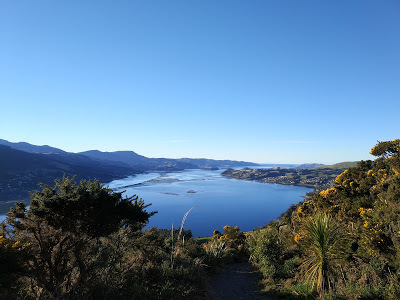 )
)7.
Sick kids, again. They've been alright this last week, but slept poorly last night and all signs point to more fevers, ear infections, Dr appointments and writerly misery.
8.
My internet connection at home has been seriously compromised this last week. It's had very little impact on my output, as the things above all but scuppered any writing time, but if it persists, it's gonna eff with my writing next week (calling ISP, staying home for technician, etc etc). Ugh.
Published on July 30, 2017 00:42
July 16, 2017
Combustion engine: Fortnight 12 of The Burns
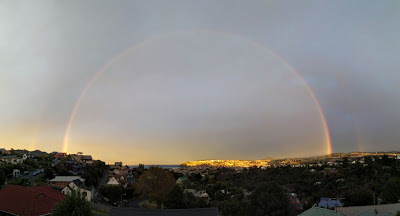 Double rainbow, Andy BayWordcount for Fortnight #12: 14,262 words
Double rainbow, Andy BayWordcount for Fortnight #12: 14,262 words1st week: 8,214 (6 writing days)2nd week: 6,048 (3 full writing days, 2 abbreviated days thanks to sick kids)90% on the novel. The rest on this blog.
Sick kids suck, but all in all: Good numbers. As in:
the most productive fortnight so far (beating Fortnight #5 - 12,320 words)8,000 words in the 1st week is more than a number of fortnights so far. The most pleasing thing is that most of it was spent on the novel.
And the quality? Meh.
But I am looking forward to butchering these chapters when I'm done with the first draft (or get further into it) and know which bits are necessary evils and which are just plain evil. And if I keep writing 6000+ words a week, I'll be butchering sooner than you can say, 'Doog tish'.
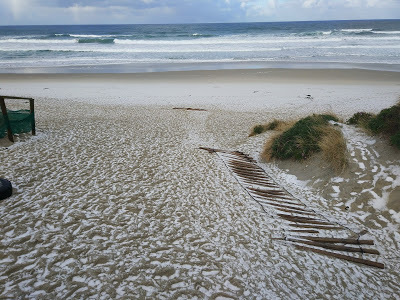 Hail on the beach, St Clair
Hail on the beach, St ClairA word or five about 'outspiration'
If you Google 'outspiration' you get a bunch of outdoorsy types using it as a shorthand for 'outdoor inspiration'.
But I'm using it as the opposite of 'inspiration'. (Yeah, I concede it's kinda dumb, but it'll do for now).
And I'm not talking about 'discouragement' or 'demoralisation' or 'outcome' or any of the other 232 antonyms for 'inspiration' listed online.
I mean those things that MIGHT have inspired you, had they existed before you created your THING, but they didn't. Your thing came first, and the potential inspiration came second.
Outspiration (n)Examples:
When one of your ideas comes true before you finish your book (and no matter how much you say you came up with the idea first, readers will always experience your idea through the thing that really happened in their past)
(1)
In my Location Scout novel (in progress), I have a young filmmaker who is offered the chance to direct a big Hollywood film that is important to a Sci-Fi franchise, only to be removed from the project in the early days of principal photography.
Then in June, Phil Lord and Chris Miller were removed/fired from the Han Solo standalone Star Wars movie.
Directors (especially emerging ones with a clear aesthetic) being removed from big budget projects is not unheard of. I mean, the director of Rogue One was sidelined / removed right at the end of production of that film, so it's not even the first time it's even happened in the Disney-era of Star Wars (NB: I only learnt about this through articles about Lord and Miller getting shitcanned).
The important thing is to note is that my book won't come out until probably 2019 (touch wood), at which point the Lord/Miller firing will be old news and people might assume this was a source of inspiration. No. It was outspiration -- the only link between my book and their firing was maybe my negative vibes made their way to Kathleen Kennedy who woke up one morning and said, 'Yes, I should fire those guys!'
Sorry, Phil. Sorry Chris.
(2)
In the same novel-in-progress I also have a successful Hollywood director who has a passion project that he has been talking about for decades but hasn't been able to make yet. He's about 10 years younger than Martin Scorsese, but he's an Italian-American filmmaker from New York, so you're more than welcome to think Scorsese-esque thoughts when reading about my fictional filmmaker.
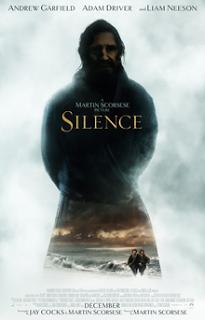 When I started working on the novel and building up ideas about this Italian-American director, it was 2015. I didn't know about Scorcese's forever-delayed film Silence. I only found out about it at the start of 2017 when it was snubbed for the Oscars and then came out in cinemas here (wherein I watched it).
When I started working on the novel and building up ideas about this Italian-American director, it was 2015. I didn't know about Scorcese's forever-delayed film Silence. I only found out about it at the start of 2017 when it was snubbed for the Oscars and then came out in cinemas here (wherein I watched it).I saw Silence when I'd written only about 10% of the first draft, so there could be ways it works itself into the text (I'm skeptical), but it most certainly didn't influence the fact that my book would have a Hollywood director finally getting to make his religiously-themed passion project. All of that was locked in before I knew about Silence.
What does it all mean?
I'm not saying I'm psychic. Or even that original. I build my plots around central ideas/problems and/or characters and overtime they gather other elements like a massive lint roller used to tidy a kid's bedroom, and then I start to write.
Aside: most often for me the lint roller is an idea - like a window dresser who raises his children to be living mannequins - that comes first; but sometimes it's a character - like the annoying best friend in The Location Scout who I knew instantly and then things like being a e-sports shoutcaster and former shut-in stuck to him.
The things that stick to the lint roller tend to be unoriginal things (a director getting fired from a big budget movie), and therefore likely to happen again in the real world either while writing the book or after publication. The challenge it to make your book original in the way you piece everything together (much the same way as you use words and punctuation to make fresh and exciting sentences... unless you're blogging).
There are a hundred other things in my part-finished first draft that could 'come true' before I finish. If all hundred happen, even then, I'm not fucked (though some of the magic will certainly be called into question). If they all happen to a small group of people, and their story gets told in a semi-narrative way... well, then I'm fucked.
But what are the chances of that??
Published on July 16, 2017 21:33
July 9, 2017
June Consumption Diary
MUSIC
Here are some of my favourite tracks from my June listening.
NB: A lot of the later entries come from a Spotify playlist called Meet the Beatlesque, which I came across at the bottom of ELO’s discography.
Also: I was considering doing a ‘best albums of 2017 so far’ as part of this month’s consumption diary, but the coverage of books and film below gotkinda long so I’ll keep my powder dry on that one.
BOOKS
Ghost Lights by Lydia Millet (novel, audiobook)
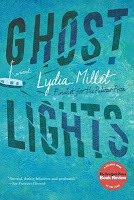 I’d been thinking a lot about Millet’s 2005 novel, Oh Pure and Radiant Heart, even though it was over a decade since I’d read it. So I chose this (it was one of two Millet options on Audible) and I loved it so much, even though I could compile a bunch of qualms about its length or structure or ending (all basically the same qualm).
I’d been thinking a lot about Millet’s 2005 novel, Oh Pure and Radiant Heart, even though it was over a decade since I’d read it. So I chose this (it was one of two Millet options on Audible) and I loved it so much, even though I could compile a bunch of qualms about its length or structure or ending (all basically the same qualm).
It isn’t anywhere near as ambitious as OPaRH (oh, I never new the initials spelled that), so it’s less memorable, but also less flawed (at least until the last fifty or so pages).
But yeah, serve me up some more Millet, please!
Why Can the Dead Do Such Great Things? by Robert Bartlett (non-fiction)
 I’d read about this book at the start of the year and its title had stuck with me. It summed up pretty well one of the main questions in the novel I’m working on (like, how come 400 years ago a guy could levitate 300+ times and convinced the Inquisition he was legit
and
not committing witchcraft and there was enough proof to be beatified and canonised after his death... and yet we don’t seem to have the capacity to believe in levitation today – so who’s wrong: the people 400 years ago, or us? Or is there a third way?)
I’d read about this book at the start of the year and its title had stuck with me. It summed up pretty well one of the main questions in the novel I’m working on (like, how come 400 years ago a guy could levitate 300+ times and convinced the Inquisition he was legit
and
not committing witchcraft and there was enough proof to be beatified and canonised after his death... and yet we don’t seem to have the capacity to believe in levitation today – so who’s wrong: the people 400 years ago, or us? Or is there a third way?)
Anyway, this book is about the cult of saints within Catholicism, from the early Christian Martyrs through to the Reformation. So the "dead people" didn’t just do great things when there were alive (heal the sick, scrutinize hearts, friggin’ fly) but they can also do great things after death (i.e. answer prayers – help you pass exams or land a plane with both engines on the fritz). I admit I skimmed this prayer stuff (I can only ask myself / you all to re-examine one materialist bias at a time).
[In June, I also read a bunch of other stuff about San Giuseppe da Copertino (most of it in Italian) – things I picked up on my travels in Italy – but I won’t list every pamphlet]
The Neapolitan Quarter by Elena Ferrante (4 novels, audiobooks)
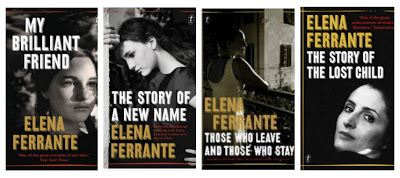
I listened to My Brilliant Friend in May. Actually, I read the first couple of chapters of the physical book in March or April. My wife was reading it, and I wanted to see if I should make time for Ferrante, but she (my wife, not Ferrante) but she reads so slowly. I would still be waiting to get the book. So I borrowed the audiobook through my local library online service.
Did it hook me? Well, I finished all four books (none of them are particularly short - the audiobooks are 12.5hrs, 19hrs, 16.5hrs & 18.5hrs long respectively; 10 hours is kind of standard for a novel) in just over two months. But *in hushed tones* I listened to these books at 1.75x normal speed. This really helped me stick with them and meant I could listen to them (and a bunch of other books) over May and June (and a little bit of July).
While hooning up Autostrade 14 in Italy, I listened to just over half of The Story of a New Name (book 2), and wasn’t sure I’d get around to finishing it. It really got bogged down with the trip to Ishcia, where it was pretty obvious what was going to happen with Nino and Lila (and Bruno and Pinuccia) but it took sooo long. Maybe this impression was compounded by the straightness of the road I was driving?? But still: those few weeks on Ischia take up more real estate on the page than any other similar span of time. I don’t doubt the importance to the overall story, but were they the most important? And it's not like the narrator, Elena Greco, didn't plough through some SIGNIFICANT LIFE EVENTS in savagely sparing fashion (often these were the most enjoyable sequences).
Anyway, I did end up listening to the last 10 hours of Book 2 in two or three days once I got back to Dunedin because the loan period was about to expire -- I was still not really hooked -- but I went straight into Book 3 (Those who leave and those who stay). Its shameful to say, but I enjoyed this book the most because it’s about Elena’s burgeoning career as a writer.
I took a break between Books 3 and 4 and read/listened to two or three different kinds of books. Ferrante’s quartet is powered by this kind of violent charge that’s both repellant and intoxicating and I felt I needed space. It’s easy to see how the repellence of masculine violence and oppression of females can be pleasing to read (At last, someone gets to stick it to the [Italian] man); but there’s a lot of girl-on-girl pscho-emotional carnage, which is more unique. The pleasure derived from this can be a bit like rubbernecking (Oh my god, female friendship is the worst! Amirite guys? Guys?) but it’s only one of many painful pleasures being exacted upon the reader at any one time.
I can’t decide if the quartet is the result of incredible ambition or incredible restraint. Is it complexly simple or simply complex?
Beyond the prologue at the start of book one, and the way the narrator concertinas time in fairly standard ways, there’d been very little prolepsis / foreshadowing. But two-thirds of the way into the final book (The Story of the Lost Child) there’s a new section (the chapter numbers restart at one) and we go all the way into the present in a few pages, then rewind back to pretty much where the previous section left off. Interesting, but I'm still trying to figure WHY it was done like that.
There’s also an epilogue, which pushes us even closer to the present day and ends with an image/event with ambiguous significance. Like: I listened to the last five minutes three times and I’m still not sure what to think except: No Clean Answers.
Final point/crackpot theory:
I'm really glad the idea of Lila (a computer wiz) hacking Elena's computer and rewriting some of the tale (which was hinted at early) was roundly dismissed by the narrator at the end. But it did make me wonder if the whole quartet of books was Lila's project, writing in Elena's voice, as a kind of revenge for Elena ripping of the Blue Fairy and turning Tina's disappearance into a book. Having freshly finished the books, I haven't gone back and read much writing about them, but I'm sure there's another four books worth of stuff on the question of authorship within the novels (let alone the 400-books worth of dross on the elusive author herself... All I can say is, if anyone had read all four books and still wants to track down the real Elena Ferrante, they're beyond dense).
The Man Who Mistook His Wife for a Hat and other clinical tales by Oliver Sachs (non-fiction, audiobook)
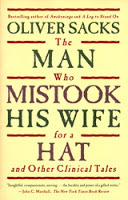 A bunch of case histories, all limited by the fact Sachs was the Dr involved in the treatment (often not the primary physician, sometimes only seeing a patient once). Even the title tale involves only two meetings and Sachs never hears from the man again. In my edition, Sachs ends almost every chapter with a postscript, often saying how many other cases he’s come across since first publishing the chapter/book, and sometimes saying the patient is still as they were 10 years ago.
A bunch of case histories, all limited by the fact Sachs was the Dr involved in the treatment (often not the primary physician, sometimes only seeing a patient once). Even the title tale involves only two meetings and Sachs never hears from the man again. In my edition, Sachs ends almost every chapter with a postscript, often saying how many other cases he’s come across since first publishing the chapter/book, and sometimes saying the patient is still as they were 10 years ago.
Despite these limitations/frustrations, it’s fascinating stuff. I went to a talk a week after finishing the book and one of Sach’s case studies was mentioned, and I felt very in the know!
FILM AND TV
In the air (return flights)
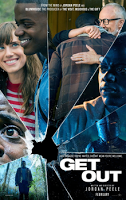 Get Out – Was looking forward to this. And it was good. But I kinda wished the baddies were more real (like Deliverance; not inbred hicks, but not totally overblown splatter-film villains). I mean, Philando Castille. Donald Trump. The world’s scary enough without resorting to Dr Frankensteins.
Get Out – Was looking forward to this. And it was good. But I kinda wished the baddies were more real (like Deliverance; not inbred hicks, but not totally overblown splatter-film villains). I mean, Philando Castille. Donald Trump. The world’s scary enough without resorting to Dr Frankensteins.
Lego Batman – Okay, so wake me when there’s a left-field superhero movie that doesn’t slip into the sinkhole of the standard superhero movie plot in the 2nd Act.
John Wick: Chapter Two - Hurrah! I haven't seen Chapter One yet. I didn't feel like I missed much in the sequel and I still want to watch the first one. Probably the mark of a great action film sequel, eh?
The Red Turtle – A shipwreck flick from Studio Ghibli? Yes please! It was great. I struggled a little with the shift from realism to fantasy (and back?) but every frame was stunning and helped carry me along. Great stuff.
Pork Pie – Not as raucous or unhinged as the original. And the raucousness and unhingedness were about the only thing going for the original (apart from the game of spotting notable landmarks and observing changes in the intervening decades).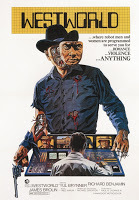 West World – the original 70s movie – So hokey, so loose, so dumb. Amazed Michael Crichton was trusted to pen anything else; glad he didn’t direct Jurassic Park!
West World – the original 70s movie – So hokey, so loose, so dumb. Amazed Michael Crichton was trusted to pen anything else; glad he didn’t direct Jurassic Park!
The Art of Scandinavia (1 episode) – I managed to catch the episodes about Denmark and Sweden on Prime (or Choice TV?) when they screened during the weekend (in March or April?), by pure chance. And fluked it again because the 1st episode (Norway) was the only one available on the in-flight entertainment. I loved Andrew Graham-Dixon’s docos when I was in high school and he doesn’t a) appear to have aged in the intervening 18 years b) varied his style one iota. Having rediscovered AGD, I’m afraid of stumbling across something online about how facile he is (which I kinda always suspected), or that he eats babies. Can’t I just have this portal back to the youth I misspent on art history and it’s all perfect and innocent and no one gets hurt? Please?
Bob’s Burgers (2 eps) – shouty, shouty comfort food.
Taboo (2 eps) – So much is packed into the pilot. So little happens in the second episode. Abandoned.
Back home
Better Call Saul (remaining episodes of season 3) – the only episode that fell flat was the finale. Everything else: man. I mean, it’s basically created a new genre: the scam show. It’s like they’ve taken one of those real life forensic shows from one of the channels with very high numbers on Sky (you know, where they try hard to distance the work from CSI shenanigans) and a legal drama where, with one extended exception (Chuck vs Kim & Jimmy) you don’t ever get to see the court room, and a police procedural, except you don’t follow the detectives but the people they don’t know they can’t catch. At the end of every episode, I’m like: that should have been sooo boring. But I was riveted. Riveted. And now I feel a little bereft. Come back Jimmy!
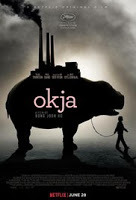 Okja – So this totally fell flat for me. Like, afterwards, I looked on twitter (it had only been on Netflix for 24 hrs so there was a lot of people talking about it) and everyone was going on about how they’d never eat meat again, but I think that’s an easy thing to tweet, especially when everyone else in your timeline has been saying they’re looking forward to this movie dropping… But gosh, it was such a sloshing slop bucket of tones. The timeline was hard to follow (the opening felt like it was in the future, then it flashed forward 10 years to the present day…). The premise was hard to swallow (that people’d buy the story of a superpig being found and 10 more superpiglets bred and raised for 10 years in 10 natural environments when a) they look nothing like pigs b) after 10 years the 2nd generation of superpigs reach maturity and to celebrate here’s a whole bunch of meat products from superpigs… eh? Like, if I was going to stop eating bacon, gimme Babe or Charlotte’s Web or a decent longread article. But not this.
Okja – So this totally fell flat for me. Like, afterwards, I looked on twitter (it had only been on Netflix for 24 hrs so there was a lot of people talking about it) and everyone was going on about how they’d never eat meat again, but I think that’s an easy thing to tweet, especially when everyone else in your timeline has been saying they’re looking forward to this movie dropping… But gosh, it was such a sloshing slop bucket of tones. The timeline was hard to follow (the opening felt like it was in the future, then it flashed forward 10 years to the present day…). The premise was hard to swallow (that people’d buy the story of a superpig being found and 10 more superpiglets bred and raised for 10 years in 10 natural environments when a) they look nothing like pigs b) after 10 years the 2nd generation of superpigs reach maturity and to celebrate here’s a whole bunch of meat products from superpigs… eh? Like, if I was going to stop eating bacon, gimme Babe or Charlotte’s Web or a decent longread article. But not this.
And:
Shimmer Lake, 30 Minutes of Less, The Trip to Italy, Win It All
Here are some of my favourite tracks from my June listening.
NB: A lot of the later entries come from a Spotify playlist called Meet the Beatlesque, which I came across at the bottom of ELO’s discography.
Also: I was considering doing a ‘best albums of 2017 so far’ as part of this month’s consumption diary, but the coverage of books and film below got
BOOKS
Ghost Lights by Lydia Millet (novel, audiobook)
 I’d been thinking a lot about Millet’s 2005 novel, Oh Pure and Radiant Heart, even though it was over a decade since I’d read it. So I chose this (it was one of two Millet options on Audible) and I loved it so much, even though I could compile a bunch of qualms about its length or structure or ending (all basically the same qualm).
I’d been thinking a lot about Millet’s 2005 novel, Oh Pure and Radiant Heart, even though it was over a decade since I’d read it. So I chose this (it was one of two Millet options on Audible) and I loved it so much, even though I could compile a bunch of qualms about its length or structure or ending (all basically the same qualm). It isn’t anywhere near as ambitious as OPaRH (oh, I never new the initials spelled that), so it’s less memorable, but also less flawed (at least until the last fifty or so pages).
But yeah, serve me up some more Millet, please!
Why Can the Dead Do Such Great Things? by Robert Bartlett (non-fiction)
 I’d read about this book at the start of the year and its title had stuck with me. It summed up pretty well one of the main questions in the novel I’m working on (like, how come 400 years ago a guy could levitate 300+ times and convinced the Inquisition he was legit
and
not committing witchcraft and there was enough proof to be beatified and canonised after his death... and yet we don’t seem to have the capacity to believe in levitation today – so who’s wrong: the people 400 years ago, or us? Or is there a third way?)
I’d read about this book at the start of the year and its title had stuck with me. It summed up pretty well one of the main questions in the novel I’m working on (like, how come 400 years ago a guy could levitate 300+ times and convinced the Inquisition he was legit
and
not committing witchcraft and there was enough proof to be beatified and canonised after his death... and yet we don’t seem to have the capacity to believe in levitation today – so who’s wrong: the people 400 years ago, or us? Or is there a third way?)Anyway, this book is about the cult of saints within Catholicism, from the early Christian Martyrs through to the Reformation. So the "dead people" didn’t just do great things when there were alive (heal the sick, scrutinize hearts, friggin’ fly) but they can also do great things after death (i.e. answer prayers – help you pass exams or land a plane with both engines on the fritz). I admit I skimmed this prayer stuff (I can only ask myself / you all to re-examine one materialist bias at a time).
[In June, I also read a bunch of other stuff about San Giuseppe da Copertino (most of it in Italian) – things I picked up on my travels in Italy – but I won’t list every pamphlet]
The Neapolitan Quarter by Elena Ferrante (4 novels, audiobooks)

I listened to My Brilliant Friend in May. Actually, I read the first couple of chapters of the physical book in March or April. My wife was reading it, and I wanted to see if I should make time for Ferrante, but she (my wife, not Ferrante) but she reads so slowly. I would still be waiting to get the book. So I borrowed the audiobook through my local library online service.
Did it hook me? Well, I finished all four books (none of them are particularly short - the audiobooks are 12.5hrs, 19hrs, 16.5hrs & 18.5hrs long respectively; 10 hours is kind of standard for a novel) in just over two months. But *in hushed tones* I listened to these books at 1.75x normal speed. This really helped me stick with them and meant I could listen to them (and a bunch of other books) over May and June (and a little bit of July).
While hooning up Autostrade 14 in Italy, I listened to just over half of The Story of a New Name (book 2), and wasn’t sure I’d get around to finishing it. It really got bogged down with the trip to Ishcia, where it was pretty obvious what was going to happen with Nino and Lila (and Bruno and Pinuccia) but it took sooo long. Maybe this impression was compounded by the straightness of the road I was driving?? But still: those few weeks on Ischia take up more real estate on the page than any other similar span of time. I don’t doubt the importance to the overall story, but were they the most important? And it's not like the narrator, Elena Greco, didn't plough through some SIGNIFICANT LIFE EVENTS in savagely sparing fashion (often these were the most enjoyable sequences).
Anyway, I did end up listening to the last 10 hours of Book 2 in two or three days once I got back to Dunedin because the loan period was about to expire -- I was still not really hooked -- but I went straight into Book 3 (Those who leave and those who stay). Its shameful to say, but I enjoyed this book the most because it’s about Elena’s burgeoning career as a writer.
I took a break between Books 3 and 4 and read/listened to two or three different kinds of books. Ferrante’s quartet is powered by this kind of violent charge that’s both repellant and intoxicating and I felt I needed space. It’s easy to see how the repellence of masculine violence and oppression of females can be pleasing to read (At last, someone gets to stick it to the [Italian] man); but there’s a lot of girl-on-girl pscho-emotional carnage, which is more unique. The pleasure derived from this can be a bit like rubbernecking (Oh my god, female friendship is the worst! Amirite guys? Guys?) but it’s only one of many painful pleasures being exacted upon the reader at any one time.
I can’t decide if the quartet is the result of incredible ambition or incredible restraint. Is it complexly simple or simply complex?
Beyond the prologue at the start of book one, and the way the narrator concertinas time in fairly standard ways, there’d been very little prolepsis / foreshadowing. But two-thirds of the way into the final book (The Story of the Lost Child) there’s a new section (the chapter numbers restart at one) and we go all the way into the present in a few pages, then rewind back to pretty much where the previous section left off. Interesting, but I'm still trying to figure WHY it was done like that.
There’s also an epilogue, which pushes us even closer to the present day and ends with an image/event with ambiguous significance. Like: I listened to the last five minutes three times and I’m still not sure what to think except: No Clean Answers.
Final point/crackpot theory:
I'm really glad the idea of Lila (a computer wiz) hacking Elena's computer and rewriting some of the tale (which was hinted at early) was roundly dismissed by the narrator at the end. But it did make me wonder if the whole quartet of books was Lila's project, writing in Elena's voice, as a kind of revenge for Elena ripping of the Blue Fairy and turning Tina's disappearance into a book. Having freshly finished the books, I haven't gone back and read much writing about them, but I'm sure there's another four books worth of stuff on the question of authorship within the novels (let alone the 400-books worth of dross on the elusive author herself... All I can say is, if anyone had read all four books and still wants to track down the real Elena Ferrante, they're beyond dense).
The Man Who Mistook His Wife for a Hat and other clinical tales by Oliver Sachs (non-fiction, audiobook)
 A bunch of case histories, all limited by the fact Sachs was the Dr involved in the treatment (often not the primary physician, sometimes only seeing a patient once). Even the title tale involves only two meetings and Sachs never hears from the man again. In my edition, Sachs ends almost every chapter with a postscript, often saying how many other cases he’s come across since first publishing the chapter/book, and sometimes saying the patient is still as they were 10 years ago.
A bunch of case histories, all limited by the fact Sachs was the Dr involved in the treatment (often not the primary physician, sometimes only seeing a patient once). Even the title tale involves only two meetings and Sachs never hears from the man again. In my edition, Sachs ends almost every chapter with a postscript, often saying how many other cases he’s come across since first publishing the chapter/book, and sometimes saying the patient is still as they were 10 years ago.Despite these limitations/frustrations, it’s fascinating stuff. I went to a talk a week after finishing the book and one of Sach’s case studies was mentioned, and I felt very in the know!
FILM AND TV
In the air (return flights)
 Get Out – Was looking forward to this. And it was good. But I kinda wished the baddies were more real (like Deliverance; not inbred hicks, but not totally overblown splatter-film villains). I mean, Philando Castille. Donald Trump. The world’s scary enough without resorting to Dr Frankensteins.
Get Out – Was looking forward to this. And it was good. But I kinda wished the baddies were more real (like Deliverance; not inbred hicks, but not totally overblown splatter-film villains). I mean, Philando Castille. Donald Trump. The world’s scary enough without resorting to Dr Frankensteins.Lego Batman – Okay, so wake me when there’s a left-field superhero movie that doesn’t slip into the sinkhole of the standard superhero movie plot in the 2nd Act.
John Wick: Chapter Two - Hurrah! I haven't seen Chapter One yet. I didn't feel like I missed much in the sequel and I still want to watch the first one. Probably the mark of a great action film sequel, eh?
The Red Turtle – A shipwreck flick from Studio Ghibli? Yes please! It was great. I struggled a little with the shift from realism to fantasy (and back?) but every frame was stunning and helped carry me along. Great stuff.
Pork Pie – Not as raucous or unhinged as the original. And the raucousness and unhingedness were about the only thing going for the original (apart from the game of spotting notable landmarks and observing changes in the intervening decades).
 West World – the original 70s movie – So hokey, so loose, so dumb. Amazed Michael Crichton was trusted to pen anything else; glad he didn’t direct Jurassic Park!
West World – the original 70s movie – So hokey, so loose, so dumb. Amazed Michael Crichton was trusted to pen anything else; glad he didn’t direct Jurassic Park!The Art of Scandinavia (1 episode) – I managed to catch the episodes about Denmark and Sweden on Prime (or Choice TV?) when they screened during the weekend (in March or April?), by pure chance. And fluked it again because the 1st episode (Norway) was the only one available on the in-flight entertainment. I loved Andrew Graham-Dixon’s docos when I was in high school and he doesn’t a) appear to have aged in the intervening 18 years b) varied his style one iota. Having rediscovered AGD, I’m afraid of stumbling across something online about how facile he is (which I kinda always suspected), or that he eats babies. Can’t I just have this portal back to the youth I misspent on art history and it’s all perfect and innocent and no one gets hurt? Please?
Bob’s Burgers (2 eps) – shouty, shouty comfort food.
Taboo (2 eps) – So much is packed into the pilot. So little happens in the second episode. Abandoned.
Back home
Better Call Saul (remaining episodes of season 3) – the only episode that fell flat was the finale. Everything else: man. I mean, it’s basically created a new genre: the scam show. It’s like they’ve taken one of those real life forensic shows from one of the channels with very high numbers on Sky (you know, where they try hard to distance the work from CSI shenanigans) and a legal drama where, with one extended exception (Chuck vs Kim & Jimmy) you don’t ever get to see the court room, and a police procedural, except you don’t follow the detectives but the people they don’t know they can’t catch. At the end of every episode, I’m like: that should have been sooo boring. But I was riveted. Riveted. And now I feel a little bereft. Come back Jimmy!
 Okja – So this totally fell flat for me. Like, afterwards, I looked on twitter (it had only been on Netflix for 24 hrs so there was a lot of people talking about it) and everyone was going on about how they’d never eat meat again, but I think that’s an easy thing to tweet, especially when everyone else in your timeline has been saying they’re looking forward to this movie dropping… But gosh, it was such a sloshing slop bucket of tones. The timeline was hard to follow (the opening felt like it was in the future, then it flashed forward 10 years to the present day…). The premise was hard to swallow (that people’d buy the story of a superpig being found and 10 more superpiglets bred and raised for 10 years in 10 natural environments when a) they look nothing like pigs b) after 10 years the 2nd generation of superpigs reach maturity and to celebrate here’s a whole bunch of meat products from superpigs… eh? Like, if I was going to stop eating bacon, gimme Babe or Charlotte’s Web or a decent longread article. But not this.
Okja – So this totally fell flat for me. Like, afterwards, I looked on twitter (it had only been on Netflix for 24 hrs so there was a lot of people talking about it) and everyone was going on about how they’d never eat meat again, but I think that’s an easy thing to tweet, especially when everyone else in your timeline has been saying they’re looking forward to this movie dropping… But gosh, it was such a sloshing slop bucket of tones. The timeline was hard to follow (the opening felt like it was in the future, then it flashed forward 10 years to the present day…). The premise was hard to swallow (that people’d buy the story of a superpig being found and 10 more superpiglets bred and raised for 10 years in 10 natural environments when a) they look nothing like pigs b) after 10 years the 2nd generation of superpigs reach maturity and to celebrate here’s a whole bunch of meat products from superpigs… eh? Like, if I was going to stop eating bacon, gimme Babe or Charlotte’s Web or a decent longread article. But not this.And:
Shimmer Lake, 30 Minutes of Less, The Trip to Italy, Win It All
Published on July 09, 2017 02:40
July 6, 2017
Light the fuse: Fortnight 11 of the Burns
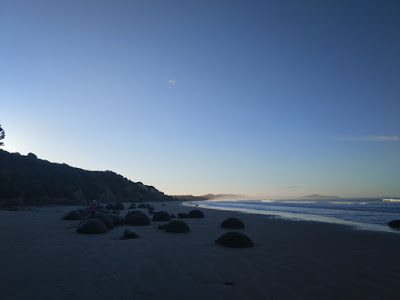 Moeraki BouldersA week late again, so this refers to the fortnight 19 June-2 July.
Moeraki BouldersA week late again, so this refers to the fortnight 19 June-2 July.Total words: 7,875
Breakdown:
Novel 5,416, Blog 2232, Other 2271st week 4595 (including a Saturday(!) and several 5am starts)2nd week 3280 (lower as I spent Thurs and Fri that week on structure/re-story boarding scene in the novel and writing NOTHING)
The main distraction in fortnight 11 was the NBA Draft. My interest in the NBA was at a low ebb during the season, thanks to the Sacramento Kings still sucking (it's 15 years since their glory days!!) and then trading their best (but admittedly problematic) player for what looked like peanuts. But one of those peanuts was a 1st round draft pick, and some luck in the lottery meant they had the 5th and 10th picks in a pretty good draft class. So I got sucked back in, big time.
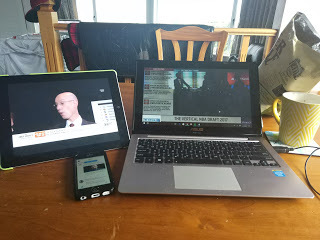 Draft day, 23 June
Draft day, 23 June (I actually wrote 1,010 words in the morning)(I didn't like any of their picks on draft dayFox was the consensus #5 pick but I think his iffy jumper and slight frame will mean he never reaches stardom and Dennis Smith Jr and Jonathan Isaac would have been better picks long term.Trading #10 for #15 and #20 was fine in principle. I mean, Zach Collins is overrated, and I'd have been angry if they took him had they kept the pick, but Malik Monk or Donavon Mitchell will both be productive players. But, leading up to the 15th pick, I though maybe it'd work out well.But Justin Jackson at #15? I just don't see him being a starter, ever. You can only draft the people that fall to you (so no Monk or Mitchell or DSJ), but I'd have taken a flier on OG Anunboy, or gone big with John Collins and picked up a wing with #20 (Ferguson, Ojeleye)Then they took Harry Giles at #20, which is fine in the context of how many okay but not great bigs they have, so you might as well swing for the fences, but I don't like his chances of ever regaining the confidence in his legs to get back to his high school form, let alone be a plus baller as a grown man. OG, Ferguson, Ojeleye (who they passed on again at #31), Juwan Evans (ditto), Caleb Swanigan, and Wesley Iwundu were all higher on my big board.At #31, they took Frank Mason, who's you're prototype college star, pro failure (at least we didn't take him with a lottery pick *cough* Jimmer * cough*). Juwan Evans was much more upside. But they were clearly going for character guys, and it looks like Mason might be the 15th man on the roster, so maybe it'll all work out.That all sounds quite negative. I'll probably wrong on half of these guys (no screenshots, please!_, which means 50% of their picks pan out, which is an okay haul in the end. So I give their draft a B, because it could have been better, but it could still be great.)
And this week they've killed it in free agency bringing in one decent player in his prime (George Hill) and too stars in the twilight of their careers (Zach Randolph, Vince Carter) who know the coach's system and can teach the young guys how to be pros for 15+ seasons.
So yeah, I know anyone who reads this blog for stuff about writing or photos of the South Island didn't read all of that, but I had fun writing it.
Anyway. PHOTOS!
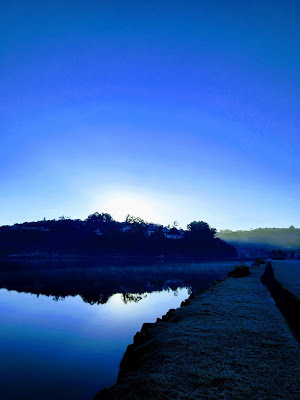 Andersons Bay inlet on a frosty morning
Andersons Bay inlet on a frosty morning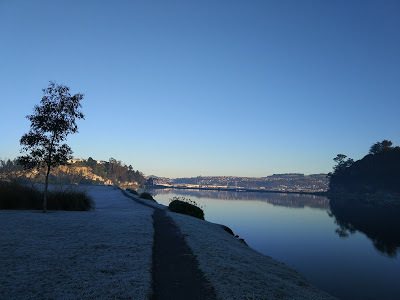 Looking the other way
Looking the other way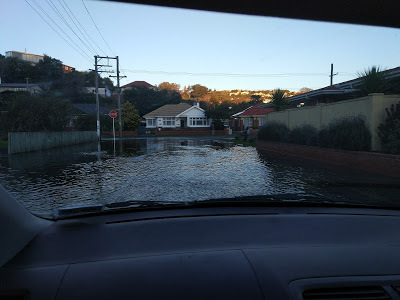 Marne St, flooded in king tide
Marne St, flooded in king tide
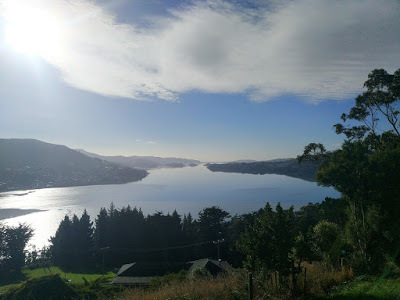 Otago Harbour, killing it
Otago Harbour, killing it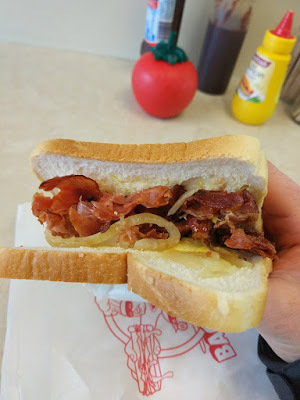 Reason #751 to love Dunedin: Bacon Buttie Station!
Reason #751 to love Dunedin: Bacon Buttie Station!
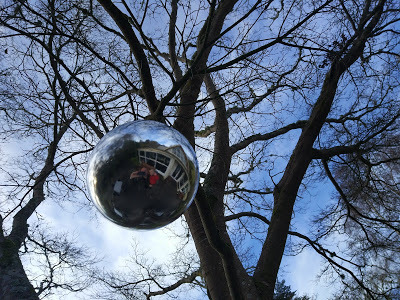 Glenfalloch selfie with son.
Glenfalloch selfie with son.
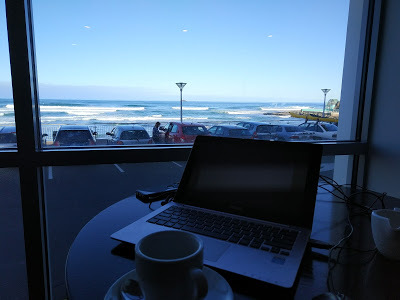 I don't often write in cafes, but when I do...
I don't often write in cafes, but when I do...
Published on July 06, 2017 21:06
June 26, 2017
May Consumption Diary
This is well overdue. Blame the change of the month coming while I was halfway through my Italian research roadie…
MUSIC
BOOKS
The hidden life of trees – Peter Wohlleben (Non-fiction, audiobook)
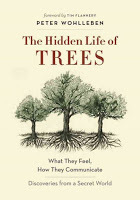 In a weird way, this book picked up where James Gleick’s Time Travel: A History left off in April. Wohlleben’s book is an exercise in imagination, as one must consider life at a different speed. Both in understanding the life and actions of individual trees, but also considering how so much of what should be done to rebalance forests requires steps that will look worse for the rest of my lifetime.
In a weird way, this book picked up where James Gleick’s Time Travel: A History left off in April. Wohlleben’s book is an exercise in imagination, as one must consider life at a different speed. Both in understanding the life and actions of individual trees, but also considering how so much of what should be done to rebalance forests requires steps that will look worse for the rest of my lifetime.
I frequently thought of that viewing platform in Zealandia where there’s a info board depicting what the forest will look like in 100 and 500 years (or something like that), and how just imagining today’s trees but bigger isn’t the future at all.
Wohlleben’s book is focused on central European species. It would be amazing to have a New Zealand version!
Religion for Atheists – Alain de Botton (Non-fiction, audiobook)
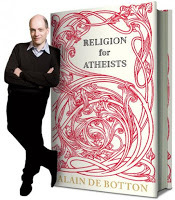 I don't condone violence,
I don't condone violence,
but AdB seems to promote it
with this eminently punchable poseI decided to listen to this book for something to argue against and it didn’t let me down. A couple of minutes in, I was beyond the point of yelling at Mr de Botton and considering yanking the earbuds from my ears. The utter flippancy with which he dismissed the miracles of Saints! It was kinda great to realise that, even if my factory defaults have all my switches set to skeptical, pure, unthinking skepticism now angers me as much as pure, unthinking belief.
I didn’t yank my earbuds in the end (in part because I was listening while riding my bike) and I found myself agreeing with some of de Botton’s suggestions (getting strangers to eat together), whilst simultaneously hating his guts (and his quasi-intellectual sophistry).
The Good People – Hannah Kent (novel, audiobook)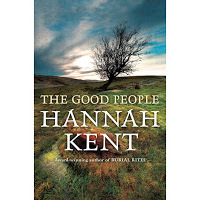 I listened to this because Hannah Kent was appearing at Dunedin Writers Festival and I was interested to see how Kent played with the concept of flawed belief (the main characters believe in The Good People, aka Fairies).
I listened to this because Hannah Kent was appearing at Dunedin Writers Festival and I was interested to see how Kent played with the concept of flawed belief (the main characters believe in The Good People, aka Fairies).
I didn’t end up going to Kent’s session (family dramas) and suspect a festival 1 on 1 wouldn’t have been the right venue for the kind of pressing questions I’d like to have seen Kent answer.
Because, I think she’d have all the answers, but how much would she squirm while answering them?
Do I even want to see another writer squirm? If this book was written by an Irish woman, would I have thought anything much about it at all? Well, of course I would have. But maybe I’d have keyed in more on the technique and gotten less hung up on ‘Why is she doing this?’
The final chapters represent a closing down of possibilities and ultimately the staid and stuffy views of the lawyers (and the more mercenary villagers) prevail.
We should have seen that coming!
Oh well.
My Brilliant Friend by Elena Ferrante
I listened to the first of Ferrante’s Neapolitan quartet before leaving for Italy. I listened to the second and part of the third while on the ground. And I’m halfway through the fourth right now --- so hopefully I can right about all four books as a single thing, which is totally how I think it should be thought of and discussed.
So hang fire for a week or so…
My Italian Bulldozer by Alexander McCall Smith
Um.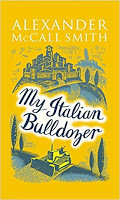 I remember watching a book show while living in Edinburgh and seeing a segment about how Alexander McCall Smith writes his books. He has a researcher and two other helpers working in an office on the ground floor of his house. He comes down, knocks out an insane amount of pages each day, and then leaves his worker bees to tidy up.
I remember watching a book show while living in Edinburgh and seeing a segment about how Alexander McCall Smith writes his books. He has a researcher and two other helpers working in an office on the ground floor of his house. He comes down, knocks out an insane amount of pages each day, and then leaves his worker bees to tidy up.
I had to walk past AMS’s lefty complex on the way to a friend’s place, and thought of the productivity going on behind that wall every time. But until last month, I’d never been tempted to actually read one of his books.
And, honestly, I only chose this one because I searched Italy/Italian on my library’s audiobook catalogue and this came up. I thought maybe, while travelling to or from or within Italy I may want something lighter.
And light it was.
After six hours of listening, it put a bow on everything, the very bows we expected from the first chapter, and then, poof, it was over, vanished, forgotten.
So that’s an Alexander McCall Smith novel?!
Shesh.
FILM AND TV
Consumed at home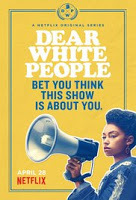 Dear White People (Season 1)– devoured. Displays the unevenness so common with shows at the moment, where the first 2-3 episodes feel dense, not just in narrative but also challenging linguistic and cultural dimensions, then the next 5-7 eps stretch out what was so great (and challenging) about those first eps, but you’re hooked so on and on you watch. Where will it go in Season 2?
Dear White People (Season 1)– devoured. Displays the unevenness so common with shows at the moment, where the first 2-3 episodes feel dense, not just in narrative but also challenging linguistic and cultural dimensions, then the next 5-7 eps stretch out what was so great (and challenging) about those first eps, but you’re hooked so on and on you watch. Where will it go in Season 2?
Consumed in the air (outbound flights to get to Rome)
Split – This sucked. I can’t believe some people thought it was a worthy (kind of) sequel to Unbreakable. Maybe I’m favourably misremembering Unbreakable? I mean, making your villain’s superpowers (and villainy) derive from a mental illness – like that’s not gonna unduly stigmatise people with that very illness? It’s pure doltishness that has no place in 2017.
Passengers – Okay, so even if the script had been seriously overhauled and allowed the film to have some kind of tension, the total lack of charisma between the two stars would have scuttled the experience anyway, so why bother, right? Who’d be a writer.Start of Fantastic beasts – just as I can’t be arsed writing the full title, I couldn’t watch more than twenty minutes of this. Three words: Eddy Redmayne’s face.
The path (episodes 1-3) – Cult research. Takeaway: cults can be very boring.
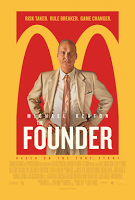 Curb your enthusiasm (2 episodes) – could have been any two. That’s the beauty, and the curse, of Curb.
Curb your enthusiasm (2 episodes) – could have been any two. That’s the beauty, and the curse, of Curb.
2night – an Italian dating flick that didn’t teach me Italian.
The Founder – Like Breaking Badwith hamburgers, only Ray Kroc isn’t smart enough to be compared to Heisenberg (someone else needs to point out he’s in the real estate business, not the fast food one), so you’re left only with the feeling that everything was horribly inevitable.
Last man on earth (1 episode) and People of Earth (1 episode) – I watched to see if these shows weren’t the same thing. They aren’t. Now I know.
MUSIC
BOOKS
The hidden life of trees – Peter Wohlleben (Non-fiction, audiobook)
 In a weird way, this book picked up where James Gleick’s Time Travel: A History left off in April. Wohlleben’s book is an exercise in imagination, as one must consider life at a different speed. Both in understanding the life and actions of individual trees, but also considering how so much of what should be done to rebalance forests requires steps that will look worse for the rest of my lifetime.
In a weird way, this book picked up where James Gleick’s Time Travel: A History left off in April. Wohlleben’s book is an exercise in imagination, as one must consider life at a different speed. Both in understanding the life and actions of individual trees, but also considering how so much of what should be done to rebalance forests requires steps that will look worse for the rest of my lifetime.I frequently thought of that viewing platform in Zealandia where there’s a info board depicting what the forest will look like in 100 and 500 years (or something like that), and how just imagining today’s trees but bigger isn’t the future at all.
Wohlleben’s book is focused on central European species. It would be amazing to have a New Zealand version!
Religion for Atheists – Alain de Botton (Non-fiction, audiobook)
 I don't condone violence,
I don't condone violence,but AdB seems to promote it
with this eminently punchable poseI decided to listen to this book for something to argue against and it didn’t let me down. A couple of minutes in, I was beyond the point of yelling at Mr de Botton and considering yanking the earbuds from my ears. The utter flippancy with which he dismissed the miracles of Saints! It was kinda great to realise that, even if my factory defaults have all my switches set to skeptical, pure, unthinking skepticism now angers me as much as pure, unthinking belief.
I didn’t yank my earbuds in the end (in part because I was listening while riding my bike) and I found myself agreeing with some of de Botton’s suggestions (getting strangers to eat together), whilst simultaneously hating his guts (and his quasi-intellectual sophistry).
The Good People – Hannah Kent (novel, audiobook)
 I listened to this because Hannah Kent was appearing at Dunedin Writers Festival and I was interested to see how Kent played with the concept of flawed belief (the main characters believe in The Good People, aka Fairies).
I listened to this because Hannah Kent was appearing at Dunedin Writers Festival and I was interested to see how Kent played with the concept of flawed belief (the main characters believe in The Good People, aka Fairies). I didn’t end up going to Kent’s session (family dramas) and suspect a festival 1 on 1 wouldn’t have been the right venue for the kind of pressing questions I’d like to have seen Kent answer.
Because, I think she’d have all the answers, but how much would she squirm while answering them?
Do I even want to see another writer squirm? If this book was written by an Irish woman, would I have thought anything much about it at all? Well, of course I would have. But maybe I’d have keyed in more on the technique and gotten less hung up on ‘Why is she doing this?’
The final chapters represent a closing down of possibilities and ultimately the staid and stuffy views of the lawyers (and the more mercenary villagers) prevail.
We should have seen that coming!
Oh well.
My Brilliant Friend by Elena Ferrante
I listened to the first of Ferrante’s Neapolitan quartet before leaving for Italy. I listened to the second and part of the third while on the ground. And I’m halfway through the fourth right now --- so hopefully I can right about all four books as a single thing, which is totally how I think it should be thought of and discussed.
So hang fire for a week or so…
My Italian Bulldozer by Alexander McCall Smith
Um.
 I remember watching a book show while living in Edinburgh and seeing a segment about how Alexander McCall Smith writes his books. He has a researcher and two other helpers working in an office on the ground floor of his house. He comes down, knocks out an insane amount of pages each day, and then leaves his worker bees to tidy up.
I remember watching a book show while living in Edinburgh and seeing a segment about how Alexander McCall Smith writes his books. He has a researcher and two other helpers working in an office on the ground floor of his house. He comes down, knocks out an insane amount of pages each day, and then leaves his worker bees to tidy up.I had to walk past AMS’s lefty complex on the way to a friend’s place, and thought of the productivity going on behind that wall every time. But until last month, I’d never been tempted to actually read one of his books.
And, honestly, I only chose this one because I searched Italy/Italian on my library’s audiobook catalogue and this came up. I thought maybe, while travelling to or from or within Italy I may want something lighter.
And light it was.
After six hours of listening, it put a bow on everything, the very bows we expected from the first chapter, and then, poof, it was over, vanished, forgotten.
So that’s an Alexander McCall Smith novel?!
Shesh.
FILM AND TV
Consumed at home
 Dear White People (Season 1)– devoured. Displays the unevenness so common with shows at the moment, where the first 2-3 episodes feel dense, not just in narrative but also challenging linguistic and cultural dimensions, then the next 5-7 eps stretch out what was so great (and challenging) about those first eps, but you’re hooked so on and on you watch. Where will it go in Season 2?
Dear White People (Season 1)– devoured. Displays the unevenness so common with shows at the moment, where the first 2-3 episodes feel dense, not just in narrative but also challenging linguistic and cultural dimensions, then the next 5-7 eps stretch out what was so great (and challenging) about those first eps, but you’re hooked so on and on you watch. Where will it go in Season 2? Consumed in the air (outbound flights to get to Rome)
Split – This sucked. I can’t believe some people thought it was a worthy (kind of) sequel to Unbreakable. Maybe I’m favourably misremembering Unbreakable? I mean, making your villain’s superpowers (and villainy) derive from a mental illness – like that’s not gonna unduly stigmatise people with that very illness? It’s pure doltishness that has no place in 2017.
Passengers – Okay, so even if the script had been seriously overhauled and allowed the film to have some kind of tension, the total lack of charisma between the two stars would have scuttled the experience anyway, so why bother, right? Who’d be a writer.Start of Fantastic beasts – just as I can’t be arsed writing the full title, I couldn’t watch more than twenty minutes of this. Three words: Eddy Redmayne’s face.
The path (episodes 1-3) – Cult research. Takeaway: cults can be very boring.
 Curb your enthusiasm (2 episodes) – could have been any two. That’s the beauty, and the curse, of Curb.
Curb your enthusiasm (2 episodes) – could have been any two. That’s the beauty, and the curse, of Curb.2night – an Italian dating flick that didn’t teach me Italian.
The Founder – Like Breaking Badwith hamburgers, only Ray Kroc isn’t smart enough to be compared to Heisenberg (someone else needs to point out he’s in the real estate business, not the fast food one), so you’re left only with the feeling that everything was horribly inevitable.
Last man on earth (1 episode) and People of Earth (1 episode) – I watched to see if these shows weren’t the same thing. They aren’t. Now I know.
Published on June 26, 2017 02:11
June 23, 2017
Cold compress - Fortnight 10 of the Burns / 20 Week review
Fortnight 10 summary(NB: this is for the fortnight ending 18 June, so I'm a week behind)
Total words: 10,600 words1st week – 3841; 2nd week – 6759)Weekly imbalance - 1st week was a 4 day week after returning from Italy, and generally getting back into the flow.Split - all on THE NOVEL except 385 on this blog.
First 20 weeks in graphsWhat follows is, on one level, meaningless. It doesn't matter how many words I write, or how quickly. All that matters is what ends up getting published.
But, as I've said before, quantity is a precursor of quality. And things like wordcounts help to keep me motivated, allow me to reflect on my practice and, hopefully, DO BETTER WRITING.
Bar chart:
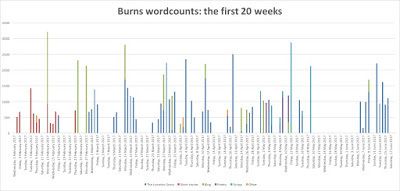
This'll probably be too small to be meaningful (even if you click on it), so let me gloss it. It's colour-coded for the type of writing (novel, short stories, blog, poetry, essays, other) - more on the split between forms later. But it shows that I focussed on short stories in February to blow out the cobwebs, before sliding into the novel in month two.
There's a lot of non-writing days. Like every Saturday (except one) and Sunday (except two), and periods where I had people staying in Dunedin or was exploring (Catlins, Fiordland, Italy - that big blank patch on the right). More on which days of the week have been more productive shortly.
Camembert:
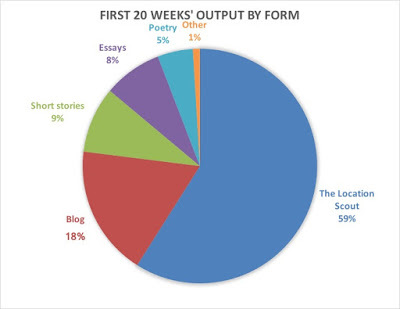
So, interestingly, non-fiction (blog + essays + other) is a pretty big slice of the pie. If you remove the Chris Cornell thing and the Recurrent Neural Network Poetry thing, the distribution would look more like what I'd have expected at the beginning of the year. I've gone and committed myself for at least one more decent piece of non-fiction (more on that in another post), but this exercise has convinced me I should probably start saying 'no' to things.
At the moment, I'm resisting a strong urge to go back to short stories. But I would like to find a way to carve out time later in the year -- like after I finish the 1st draft of the novel and before I start second draft, but that relies on me getting to the end of the first draft this side of Christmas...
Speaking of.
Line graph:
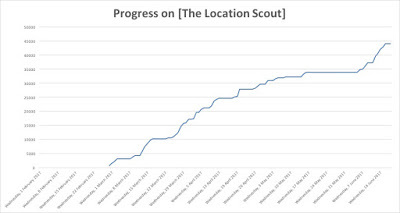
This is a little misleading.
When I open my working draft of the novel later today, it won't be 44,000 words, more like 36,000. These stats represent the cumulative total of my daily wordcounts on the novel, rather than the actual wordcount of the novel-in-progress.
So I've lost about 8,000 words already. This tends to happen when I'm starting a new section and I do it in a fresh word document, work on that for three or four days, then cut and paste the cream into the novel's main document.
Some examples for future reference that won't mean anything now: the Motta quotes between the first and second section (only about 2/3 made it in; these may be further slimmed down as time goes by); the Curio Bay insert.
To get to 36K after four months is okay, I guess.
I probably should have done a post at the start of the year about my expectations... If I did, I might have said 10K per month (only takes around 500 words every week day) as the minimum, but this wouldn't have factored in two weeks in Italy (and the prep for such a trip). Which would put me right around my floor.
So a little disappointing, especially as I feel the manuscript is getting a little flabby at the moment and I need to go back over the last 30 or so pages and trim, trim, trim. (But the other fifty pages have had that treatment already and feel tighter. So my first draft isn't rip, shit and bust. When I get to the end, it's probably my draft 1.5.)
Looking ahead, I should be about to meet and exceed 10K a month until I finish the 1st draft. At the moment I'm less certain about the total length of the novel than I was when I started. I'd have said 70-80K in February. Now, It feels 110-120K (about the length of THE MANNEQUIN MAKERS). But that's for the first draft - I may get savage in editing and create something sleek. May.
Doing the maths on this minimum scenario: if I need to produce another 80K words, that'll take 8 months but I only have 7 before the end of the residency. And what about Christmas and all the logistics of moving back to Wellington (probably have to go back a little early so my daughter's settled before starting school at the end of January)?
And I can kiss goodbye to my dream of a fortnight to work on short stories while I let the completed first draft breathe.
If I want a finished first draft by the end of November, I'll need to 16K a month. That seems doable. The last two weeks I've been able to produce around 1,000 words a day, so 10K a fortnight.
Doable, but not yet bankable.
What do the numbers say?
Which day of the week is my most productive? Part 1

NB: this is wordcount across all forms, not just on the novel.
This result really surprised me. In an earlier fortnight summary I said Tuesdays were my most productive days, which made sense as I take the weekends off, Monday involves a bit of working myself back into the flow, and Tuesday is where I still have the energy and enthusiasm and direction.
But Friday?
And what's up with Wednesday being so paltry. Do I run out of energy after only two days of writing? Or is it that I only have two days of clarity about what I'm writing before having to scratch around on Wednesdays to be able to be more productive the rest of the week?
Then I considered how these numbers were calculated. It's the average of all wordcounts from the given day of the week, divided by the number of those days thus far (19 for Monday and Tuesday, 20 for the others).
But what about all the zero days? Surely they weren't distributed evenly.
And they weren't. Of the 19 Mondays, I had 7 goose-eggs. Wednesdays had 8 non-writing days out of 20. But Friday only had 4. This seems to be a quirk of when I've been travelling or had people come to visit from up North.
This is what it looks like if you take all the non-writing days out of the equation...
Which day of the week is my most productive? Part 2

That's more like it.
I'm still surprised Monday beats Tuesday. This may be due to some of the blogging that happens on Monday.
And the dip on Wednesdays and Thursdays? That's something to reflect on. It'd be great to pull those days up to 1,000 words per day, though that might be quite hard given I'm already 20 weeks in.
Total words: 10,600 words1st week – 3841; 2nd week – 6759)Weekly imbalance - 1st week was a 4 day week after returning from Italy, and generally getting back into the flow.Split - all on THE NOVEL except 385 on this blog.
First 20 weeks in graphsWhat follows is, on one level, meaningless. It doesn't matter how many words I write, or how quickly. All that matters is what ends up getting published.
But, as I've said before, quantity is a precursor of quality. And things like wordcounts help to keep me motivated, allow me to reflect on my practice and, hopefully, DO BETTER WRITING.
Bar chart:

This'll probably be too small to be meaningful (even if you click on it), so let me gloss it. It's colour-coded for the type of writing (novel, short stories, blog, poetry, essays, other) - more on the split between forms later. But it shows that I focussed on short stories in February to blow out the cobwebs, before sliding into the novel in month two.
There's a lot of non-writing days. Like every Saturday (except one) and Sunday (except two), and periods where I had people staying in Dunedin or was exploring (Catlins, Fiordland, Italy - that big blank patch on the right). More on which days of the week have been more productive shortly.
Camembert:

So, interestingly, non-fiction (blog + essays + other) is a pretty big slice of the pie. If you remove the Chris Cornell thing and the Recurrent Neural Network Poetry thing, the distribution would look more like what I'd have expected at the beginning of the year. I've gone and committed myself for at least one more decent piece of non-fiction (more on that in another post), but this exercise has convinced me I should probably start saying 'no' to things.
At the moment, I'm resisting a strong urge to go back to short stories. But I would like to find a way to carve out time later in the year -- like after I finish the 1st draft of the novel and before I start second draft, but that relies on me getting to the end of the first draft this side of Christmas...
Speaking of.
Line graph:

This is a little misleading.
When I open my working draft of the novel later today, it won't be 44,000 words, more like 36,000. These stats represent the cumulative total of my daily wordcounts on the novel, rather than the actual wordcount of the novel-in-progress.
So I've lost about 8,000 words already. This tends to happen when I'm starting a new section and I do it in a fresh word document, work on that for three or four days, then cut and paste the cream into the novel's main document.
Some examples for future reference that won't mean anything now: the Motta quotes between the first and second section (only about 2/3 made it in; these may be further slimmed down as time goes by); the Curio Bay insert.
To get to 36K after four months is okay, I guess.
I probably should have done a post at the start of the year about my expectations... If I did, I might have said 10K per month (only takes around 500 words every week day) as the minimum, but this wouldn't have factored in two weeks in Italy (and the prep for such a trip). Which would put me right around my floor.
So a little disappointing, especially as I feel the manuscript is getting a little flabby at the moment and I need to go back over the last 30 or so pages and trim, trim, trim. (But the other fifty pages have had that treatment already and feel tighter. So my first draft isn't rip, shit and bust. When I get to the end, it's probably my draft 1.5.)
Looking ahead, I should be about to meet and exceed 10K a month until I finish the 1st draft. At the moment I'm less certain about the total length of the novel than I was when I started. I'd have said 70-80K in February. Now, It feels 110-120K (about the length of THE MANNEQUIN MAKERS). But that's for the first draft - I may get savage in editing and create something sleek. May.
Doing the maths on this minimum scenario: if I need to produce another 80K words, that'll take 8 months but I only have 7 before the end of the residency. And what about Christmas and all the logistics of moving back to Wellington (probably have to go back a little early so my daughter's settled before starting school at the end of January)?
And I can kiss goodbye to my dream of a fortnight to work on short stories while I let the completed first draft breathe.
If I want a finished first draft by the end of November, I'll need to 16K a month. That seems doable. The last two weeks I've been able to produce around 1,000 words a day, so 10K a fortnight.
Doable, but not yet bankable.
What do the numbers say?
Which day of the week is my most productive? Part 1

NB: this is wordcount across all forms, not just on the novel.
This result really surprised me. In an earlier fortnight summary I said Tuesdays were my most productive days, which made sense as I take the weekends off, Monday involves a bit of working myself back into the flow, and Tuesday is where I still have the energy and enthusiasm and direction.
But Friday?
And what's up with Wednesday being so paltry. Do I run out of energy after only two days of writing? Or is it that I only have two days of clarity about what I'm writing before having to scratch around on Wednesdays to be able to be more productive the rest of the week?
Then I considered how these numbers were calculated. It's the average of all wordcounts from the given day of the week, divided by the number of those days thus far (19 for Monday and Tuesday, 20 for the others).
But what about all the zero days? Surely they weren't distributed evenly.
And they weren't. Of the 19 Mondays, I had 7 goose-eggs. Wednesdays had 8 non-writing days out of 20. But Friday only had 4. This seems to be a quirk of when I've been travelling or had people come to visit from up North.
This is what it looks like if you take all the non-writing days out of the equation...
Which day of the week is my most productive? Part 2

That's more like it.
I'm still surprised Monday beats Tuesday. This may be due to some of the blogging that happens on Monday.
And the dip on Wednesdays and Thursdays? That's something to reflect on. It'd be great to pull those days up to 1,000 words per day, though that might be quite hard given I'm already 20 weeks in.
Published on June 23, 2017 11:46



